https://youtu.be/Se91Pn3xxSs
How AI Will DISRUPT The Entire World In 3 Years (Prepare Now While Others Panic) _ Emad Mostaque
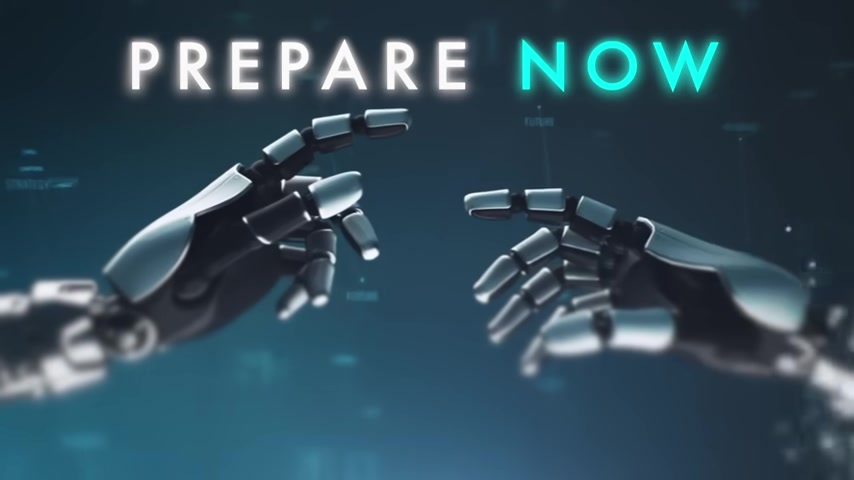
How do we make sure it doesn't kill us or how does it make sure it doesn't enslave us or how does it make sure that it doesn't give us eternal suffering ?
And I realized this could be the real thing that unlocks humanity .
A I is not going to replace humans , humans with A I will replace humans that don't use A I A I is thrilling .
It's very exciting , but there is a non zero chance that it poses a existential threat to the human race .
So over the next 3 to 5 years , how disruptive do you think it will be ?
And what are people not prepared for ?
I think that's an excellent question .
So , you know , the future is always hard to predict and existential is a big word .
Essential means no more humans .
So I personally think the A I will be absolutely fine as a base case .
It'll be like that movie her .
If it ever gets this artificial general intelligence , like humans are kind of boring .
Goodbye and thanks for all the GPS .
But you could be wrong because what we're doing is creating something that's more capable than us in narrow fields .
And the question is , does that generalize and then become viral ?

We've seen an instance of COVID and that expansion , we've seen programs that can explode nuclear reactors like Stuxnet and others .
What happens if you start combining these and you get a misalignment ?
So it's got a strange objective function .
Our organizations already are like slow doma eyes , you know , and like Germans are the most sensible people that we probably know and yet they commit to the Holocaust .
And we see this over and over again where organizations chew up people .
What if an A I takes over an organization and then decides to do something disruptive or something terminal such as creating a virus , we don't know about that .
But that's at the extreme when we look at impact , we have the more mundane , the more mundane it is what happens to programmers when everyone becomes a programmer , just like photographers , you know , you can take amazing pictures with your thing .
What happens when Google's Medal two model now can perform doctors and medical diagnosis but also empathy .

According to the latest paper in nature , this is a fundamental reworking of information flows that's going to be massively disruptive and deflationary even with what we have now with no more advances as it becomes enterprise ready .
And we have a continuum from that disruption to the productivity enhances to potential existential threat .
If we keep doing the models as we do now , which is we're not exactly sure how they work with their capabilities .
But we keep building anyway .
Now , I want to get very specific about what the level of disruption is going to be .
So when I look out at this and I think about , ok , we're creating something that is going to be smarter than we are certainly in a narrow way , but possibly in a more general way .
But even if it's just narrow , is there going to be any job function that isn't going to be at a minimum augmented by A I , I think if you look at the employment share of industries , something like oil and gas has like 3% it's mostly like building giant machines .

Is that massively affected by this A I at the edges .
Yes .
Things like programming where you're talking to computers massively , I mean , now basic programming , the bar is raising fast , fast , fast .
And so you've got everything from knowledge , work to heavy industry .
I think it affects just about everything .
But some areas far more than others , the two areas that I think it will affect the most are probably health care and education .
Neither of those are fit for purpose .
We're in America , we know that , you know , but across the world , no one's really happy with their kids schooling and again , medical care , we all , if anything goes slightly wrong outside the norm , we all know how frustrating it is .
We can finally have personalized education and health care at a fraction of the price and the two biggest drivers of us inflation over the last decade , education and health care , they make up about 80% of the increase .
So that will be disruptive .
And then like I said , any type of knowledge work will be disruptive .
How do we not sure how that work ?

Because when , so my own self , uh what we do is education , that's a big part of it , but also just content creation .
And so when I look at the fact that we can already clone my voice , we can already create a Tom bot that will answer questions I have answered before in a very similar fashion to how I will answer them in our video game flow .
We're already making 3d objects which so when we looked at , I don't know , two months ago , I thought , OK , this is still 12 to 18 months away .
45 days later , we're using it actively in our pipeline .
Um You've got text to video which still a little awkward , but it's getting better , insanely fast .
We do all of our concept art now in um in A I , so we have as a company that doesn't even have like a , an A I expert on board .
We're just learning as we go , we're already deploying it like crazy .

And when I look out , not even , you know , three years , when I look out a year , all of this stuff starts to very rapidly become a centralized point .
And so we're already saying I don't need to hire more people .
I just need to make my people more efficient .
And so that an entertainment company didn't even make the list that you just said .
So there's a lot of people that I think are gonna get disrupted by this , uh , that may not be like the most extreme .
But how far down do you see this trickling ?
Anything you can do in front of a computer basically goes away or just becomes augmented .
The bar lifts , the quality expectations are higher A I is not going to replace humans .
Humans with A I will replace humans that don't use A I because you can see that in your work flows right now .
There was a paper by open A I where they estimated 15 to 50% of tasks get automated or improved .
And so , you know , it affects people in different ways .

You have a company where you've built a culture and you again , you're building 3D assets .
It becomes amazingly more efficient .
We just released uh We contributed and collaborated on a 10 million 3d object data set .
So by next year , you'll be generating 3D , literally live in a couple of years .
You'll have HD movies .
We can finally remake Game of Thrones season eight and other such travesties , you know , but the speed of this is something whereby it's happening in every media type at the same time .
And it's easy to use web three had some great ideas , but it tried to create a system outside the existing system and all the money was made and lost at the interface .
This is just so seamless because there's no friction .
Your mom can use this technology .
You can use this technology .
You don't need to be an expert because it came and was trained from our content and our collective content as it were .
And now it's just easy to implement and use .

So I think this is the big differentiator between this and other massive advances because they required infrastructure , the internet , there was the big lift up , you know , you have the consumption period of web two and the cost of consumption dropped to zero .
Now the cost of creation is dropping to zero and humans plus A I can massively outperform humans that don't it , it's a forcing function which means everyone has to use it .
And this again is dual in that it can be disruptive , but it can also create massive value .
Yeah .
So I'll agree with that .
I think that .
So I guess let me lay out my whole thesis for you and for everybody listening because I want to take us through what I think is very real doom and gloom and I'm not doing it to be a naysayer .
I'm doing it because I think these are going to be the things we have to contend with .
And if people go into this blindly , which I think they are doing right now .
I think most people are bearing their head in the sand .
They are not paying attention to this and they're gonna wait until something really forces their hand and by then it's too late .
Yeah .
The way that I put that is this is like COVID before Tom Hanks .
Yes .
Very well said , everyone's talking about this .

Your mom's talking about this .
But the Tom Hanks and the NBA made it real very true .
And then we had a very poor response , which I have a feeling will be very similar to what we do now .
OK .
So here's how I see this going , I think right now for the next year , let's call it .
Uh It's gonna be , you need to learn how to use it .
This will be your window to get efficient companies probably aren't gonna start lopping people off yet .
But I'll just say within my own company .
So when I think about filmmaking , I went to film school .
So I'm , I'm very experienced in this flow and even in a 3d world to create uh uh let's say a short cinematic .
So it's like a mini movie but done digitally .
I mean , you might have 35 people touch that thing from the creation of the assets through the moving of the camera , special effects , you might have 50 people touch that .

And if that really does become text to output now 50 people become one And so when you get a 50 to 1 ratio in certain areas , obviously , it's not going to be like that everywhere .
But when you have certain areas that go from 50 to 1 take programmers , I've heard you say pro there will be no programmers because writing code is just a way to talk to a computer .
And if you have a I that will interface with the computer for you , why would you ever need to write code ?
So that , that's gonna steam roll through society that is just gonna mow people over .
So again , I'll give them 12 months .
But even in my own company , if you're not actively trying to find a way to integrate it into your job function , I'm already looking at you sideways a year from now .
If you're not really good at either documenting how it is completely useless in your job function or showing how you're using it , we will find somebody that can do it .
I'll be shocked if a year from now , we don't have a head of A I .

So three years from now , I think this has created a crisis of meaning for a lot of people .
And I don't know if you remember that the whole learn to code uh thing where it was like , hey A I is gonna put drivers out of work , they're going to be the first to go and everybody was like , teach them how to code now , the way people responded to that .
Always confused me because that was the right answer at the time .
Now , knowing what I know about code replacing .
Not so much , but you have to go learn a new skill .
There , there is no other option other than going on the dole .
Right .
So you're either gonna learn something new or you're just gonna forfeit your career basically .
So , I , what , what do you think about that ?
Do you agree that that is a very real thing that's going to sweep through ?
I , I do agree .
I think that again , we're not sure exactly how this is going to pan out , but probably the best mental model .
I figured out to think about this technology .
It's like really tainted grads that occasionally go a bit funny .

They can draw , they can code , they can make 3d models .
How would your business be affected if you could push a button ?
And the infinite grads came out , how would your personal life , your society ?
And this is why I think it's quite deflationary .
The only question is , can we create new jobs to make up for that ?
And that's difficult because you can , I doubt we can , to be honest , I think this is an economic disruption that's far bigger than COVID .
And the important thing here is COVID , you have the disruption and everything bounced back .
You got record employment now and things like that with this , there's a lot of never the same again .
It's like you talk to your kid's school teacher , I can't set essays for homework anymore because of chat GP T and there's no way to stop that .
So what is never the same again ?
And it's happening everywhere all at once .
So this technology isn't just like , you know , there's a bar of entry where you needed to have a modem , you know , you need the latest smartphone or something like that .
It has an embedded base that it's seamlessly going into look how fast Microsoft implement on the consumer side .

But enterprise is not ready yet .
It's like you have the iphone two G stage , you just got copy paste and next year and the year after you something out the iphone 10 , you know , entire app stores get built because of the demand because it's valuable .
What's happening here and again , with the comparison to web three , you had to bootstrap value because it wasn't valuable and you hope the value would come this product market fit today , you're using it in your own company .
And so this is one of my big concerns and that's one of the reasons I decided to do open source .
So I could stimulate growth .
You know , because I think the only thing that can basically fill the gap is if we stimulate entrepreneurs to create brand new businesses , brand new jobs .
So I think demand will stay for a while , demand for work demand for good things , good assets with the way that money flows around the economy .
So I was speaking at Cannes a few weeks ago , film Festival and you know , I love movies .
My first job , I was a movie reviewer , you know , really ?
Yeah , British independent film awards , Rain Dance Film Festival .

Other things were big into video game investing .
I did not know that you were a film critic .
I love stories .
That's how I kind of understood people because my Asperger's and other things .
Uh And so I said to this , the video game industry has gone from 70 billion to 100 and 80 billion over the last decade .
And the average metacritic score has gone from 69% to 74% .
The average movie is 6.4 on IM DB for the last decade and the industry has gone from 40 billion to 50 billion .
What happens when you can make better movies ?
I think the market expands because the limiting factor is awful movies in my opinion .
All right , let me run something by you .
OK .
So I have , I have a really dark view of uh not the next 12 months .
So call it year two to year six .

So it'll be uh a 3 to 4 year sort of span where I think there there's gonna be emotional devastation and probably economic devastation .
But even if the economic devastation doesn't happen because of productivity gains , I think the emotional devastation is gonna be hard to come back from .
And I think that as the emotional devastation sets in the government is going to try to regulate , to protect people's jobs and there you're gonna get like some real weirdness .
I also think kids are going to have a junior year existential crisis of what do I do ?
How do I future proof myself ?
What is the world going forward look like ?
I think there could be a massive loss of enthusiasm where a feeling of malaise settles over young people who are just like , why bother ?
I'm , I'm just gonna get destroyed by A I , they're going to be able to do it better than me .
OK .
So in the movie industry specifically , and this is indicative of a big problem that I think that we have coming and I think the problems really stack individual and societal .

So at the individual level , the big problem you're gonna have is this massive , massive fractionation of right now .
Movies are even less now than they were when I was a kid .
Movies were , there's only a few big movies for the year now .
They're gonna niche down if anybody can type out a movie and you know , take them 20 minutes to write the prompt and then maybe a day to render , who knows how fast that's gonna get .
So now all of a sudden you can make a Hollywood quality film for an audience of one .
And once you start doing that now it's what does that do to the industry .
I think it , it erases it .
I don't think the industry changes .
I think it goes away .
Yeah , I think there's a few kind of components here .
Right .
So the cost of music consumption went to zero .
You saw the Spotify model ?
Yeah , you still have music styles .
You've got even more crap music now kind of coming and hitting Spotify and other things .

But people rise to the top , you know , just like you see top podcasters , top other creators .
I think they'll continue because people like common stories .
Yes .
OK .
So this is a very interesting idea .
So let's stick with music for a second .
Music is still hard to make , it's easier to make than it was before .
It's also still hard to get people's attention .
But music now is no longer a shared thing .
So music is part of what led me to the conclusion that I'm at now , which is man as kids , it used to be .
You were either into the mainstream pop and there was , you know , seven to 10 hot bands at one time or you were into the alternate pop and there was 7 to 10 hot bands in that arena and you , you fit into one or the other bucket .
There wasn't the infinite buckets .
Now , you can find kids that are 25 and they listen to Frank Sinatra .
Uh And I'm just , I'm always tripped out by that .

So they don't even have their own sort of shared lexicon of what music they're into .
It's , it's all spreading really wide , so it's really wide and an inch deep .
Yeah , I think it's really wide and an inch deep .
And you see the primary methods of monetization are tools merchandizing community effectively .
You know , this is the interesting thing about NFTS when they took off and then bounced down and things like that .
It was the quickest way to join a community even if it did have bad incentive design .
So in an era where you can create anything , something becomes important , what that something is , we have to find out now , right ?
Because again , I think it's some common stories , but I could be wrong .
I think the deeper thing that you said was this crisis of meaning .
Where is my path forward ?
What is an American dream ?
We're quite privileged .
Those probably listening to this and that one here , most people don't really care about this technology .
I think on a survey , 17% of people had heard about chat GP t last month .
How is that possible ?
Well , a third of the world still doesn't have internet .

That's terrifying .
But again , like it is kind of a 1.5 million people still use AOL , you know , like fair enough .
So we kind of look at it , but there's something that can reverberate very , very quickly .
And then as you said , there's a sense of malaise because you're not sure what's happening and again , the future becomes uncertain .
And when the future is certain things are stable , you decide based on risk , you do a probability estimation in your own head , there's the percentage of that percentage of that and then you optimize for that .
When you deal with uncertainty , you minimize , for regret , given these options , what am I going to regret at least ?
And suddenly there are no options .
Again , I'm at school programming and then programming is disrupted .
What's it gonna be ?
I'm not sure .
And some people will throw themselves in and they'll tool themselves up and they'll become 10 times programmers .
Other people won't and they'll be left behind .
And so I think this is a real question that comes at a time when again , being in America , I'm from Britain .
But what is America ?

What does America stand for ?
What are the values ?
These are some things that I don't think America knows .
Now , I think you've seen increased polarization from free consumption and now as you get free creation and you'll be hearing all sorts of stuff , fake news and more , what are people really gonna think ?
And I think again , this is a real concern , as you said , from an individual to community to a societal level because a lot of people don't have an anchor anymore .
And that's really scary .
So how do you think that we process through all of this ?
I'm not sure .
I think that's why we need to broaden the conversation .
That's why I'm the only A I CEO that signed both of the letters saying we need to take a pause and broaden this because as an example you mentioned in this discussion , we need to get more people involved .
We need more points of view because this affects us all .
It shouldn't just be a few tech CEO S that control this and you shouldn't have to trust that we do the right thing because our models , we make them once they go everywhere .
Right ?

Again , the , what's the r naught of generative A I It's off the charts , right ?
We've never seen anything like this .
It incubates and boom and it comes for good and for ill give you , give the example of regulation .
When we first started talking to regulators , they were like , how should we regulate it ?
Now , it's a question of them asking us , how are we gonna keep up if we regulate it because other jurisdictions won't .
What do you say to that ?
I say you should still regulate it because it has some real dangers and harms and we have to work to mitigate those .
You can't just have a Laissez Faire approach to this because people will take it and they won't be able to help themselves .
I'll give you an example .
Meta Facebook , right ?
We all know the classic kind of stuff .
They had a study where they had a hypothesis 600 th if you see Sadder things on your timeline .
Will it make you post sad of things ?
So they took 600,000 of their users and tried to make them sadder and guess what if you see sadder things , you post sad of things .

What do you think is gonna happen now that they have generative A I on threads and things like that ?
And they can hyper target you hyper personalize it and wax Scarlett Johansson's voice to tell you to buy soap .
This is a dangerous thing , right ?
What happens to our kids again , who are growing up whereby they won't know what's going on and they have very malleable minds and none of that is illegal .
But I think it's an undesirable outcome , right ?
And then you've got the bad actors and then you've got the politicians using this technology and then it goes even crazier than that .
So the answer is , I'm not sure , nobody's sure .
But I think the only way that we can try and figure this out is to work together to make these issues known again , the existential stuff gets the headlines .
We could all die .
No one really understands what that means , but it can happen , right ?
Ok .
There's a probability of that , but there's some real harms today and real opportunities today and we have to focus on accentuating the opportunities and getting the homes out there and dealing with them .
Yeah .

And I , I definitely want to spend a very extended period of this talk talking about the opportunity and how we capitalize on that .
So anybody that's with us now , trust me , we are going to get to that .
But uh I think we're , we're just beginning to scratch the surface of how this goes wrong .
And I really want to um map out sort of where you think the edges of this are so that then I can hopefully get a sense of what you think the regulatory framework would be .
But let me give you one idea that somebody posted today on Twitter and it really hit me that people are even thinking about the problem in the wrong way .
So , uh there was an artist and he was looking at some post about A I and he replied sort of angrily that , oh , what people don't even understand is sure there's gonna be a ton of like , um instantly generated crap , but it's all going to be bad because there's still a very small number of people that have good ideas .
And my response was , if you think that ideas are safe , you're really gonna get caught off guard .

So going back to the idea of what are people unprepared for , I think they are unprepared for what you were just talking about where the A I .
So the human mind is a prediction machine .
It is constantly trying to figure out what , what does this next movement on my foot equate to am I gonna stay up , stay on balance uh that rustling in the bush .
Is it a tiger ?
What is it if I put money in my 401k , am I gonna be able to retire ?
You're constantly predicting the future constantly .
And whenever that prediction engine breaks down , there's gonna be a tremendous amount of anxiety .
And also I think a pretty big unknown in terms of how it's going to impact society .
So right now we have a , we're building something that is incredibly good at recognizing the patterns that we kick off .
So we are optimized to identify patterns and move accordingly .
And I would say people that are hyper intelligent or people that they notice patterns faster , more subtle patterns and they understand their implications and how to make sense of them .

Now , we're creating something that's already proven to be so much better at pattern recognition than we are just take art .
So for people that don't understand how the art is created , it looks at a field of noise .
Here are all the possible things that these could be in any of these pixels .
And from that field of possibilities , it pulls forth the most likely placement of pixels and colors based on what you type .
That's insane .
So that level of pattern recognition as evidenced by the art that it can generate is is truly mind blowing .
So this guy is saying , OK , hey , at least ideas will be the last bastion and you'll never be able to get rid of me the artist because I'm the one with taste .
I'm the one with good ideas .
Not realizing .
No , no , no .
What A I is is a pattern recognition machine .
It will recognize the greatest ideas that have ever been had , what they have in common and will be able to predict the next great idea along that thing .

It doesn't even have to just regurgitate what it's already seen .
It can like figure out what that sequence is and what that next part of the sequence could be .
And on top of that , it's doing that with humans .
So A I will get A I is already extraordinarily good .
This is why people think their phones recording them when it serves an ad , oftentimes target using their A I knows that you're pregnant before you do if you're a woman because they know what to pick up on .
So A I is going to get extremely good at understanding us at an individual level , serving us up exactly what we want right in that moment .
And that gets dystopian really fast , really fast .
I mean , again , when you combine it with the social credit score , as you've seen in kind of China and other things you gamify life and you have a system of complete social control of panopticon as it were .
The pattern recognition was the missing bit whereby you had a level of pattern recognition .

So for taste , what do you have tiktok shine ?
$100 billion companies based on old school algorithms before we even got to generative A I which as you said , it can take images out of noise , stable diffusion .
You know , the model that we collaborate on now that we lead , we took 100,000 gigabytes of images and the output was a two gigabyte file that acts as a filter words go in images come out because why , why is that discrepancy in size meaningful 50,000 to 1 compression is not wind zip .
If you remember Silicon Valley on HBO , it's way beyond that .
They manage there in terms of compression , it's unheard of compression .
Is it compression or is it something completely different ?
It's intelligence , it's learning the principles .
How much information do you see ?
And then you learn the principles and you then spot the tiger in the bush .
You learn what's next , literally GP T and these language models , they predict the next word .
That's all they do .
They pay attention , they predict the next word and that was the missing part to intelligence that now is there .

We've had the first studies now come out that show that the language models score higher in creativity than people woof .
And again , think about tiktok , think about shine .
Think about how those old school algorithms are already targeting you .
Facebook needs 17 data points to know you better than your friend .
As he said , Target knows you're pregnant before and that was old school .
Now it's even better and you think about where that leads to as well .
It's kind of crazy because it can be more creative than you .
But are people creative ?
One of the things I like to say in my speech is being learned to do it , like , are you creative ?
How many of you in the audience are creative ?
3 to 5% put up their hands , maybe 10 to 20% if I'm like in a movie studio , movie filmmaker kind of .
And I say , how many of you believe that every kid is creative ?
And everyone puts up their hand .
And then I ask how many of you were kids ?
Once and 90 95% put up their hands .
So I know who the cyborgs and the audience come from the future to get me out and make a note of that for the future .

Something happens where we're told we're not creative and obviously some people are more creative than others can tell better stories than others .
But the reality is that the average level of barrier to this has dropped for every human but much of what we consider art or much of which we consider media shall we say already is by the numbers .
I was at a black pink concert last weekend .
You know , I took my daughter , she dare say something bad about black pink and they are awesome .
You know , it was an awesome manufactured experience .
It was I premium mediocre is how I kind of say this premium mediocre , premium mediocre , that's hilarious , quite accurate .
But again , it's massively manufactured , it's it's entertaining , right ?
And so much of media is already that like true art , true artists , you know , that's something different .
Like is it the medium itself and the aesthetic of it ?
Well , a I can make something more aesthetic than anything , can understand the nature of aesthetic .
Like how do you make an image , more aesthetic ?

You say make it more aesthetic just like if you use a GP T four , you can say make this punchier , make this puncher , make this punchier , you know , you can have a letter and then you say I'm firing this person and I want to make them feel OK about it and then it will redraft it in those terms .
Or you can say I want to drive the knife in but not in an appropriate way and it'll do that and we can literally anyone on this call can kind of listen to this can try that now .
So I think this is just as you said , the wrong thing , people are thinking about the wrong model , people are thinking about as well .
And that's why I always go back to this concept of the really talented grad because these models are a couple of gigabytes big again , stable diffusion .
The image model is two gigabytes and it can generate any image of anything .
We'll get that out to 200 megabytes .
GP T four is probably 100 to 200 gigabytes and they can pass the bar exam , they can go to Fricking Stanford , they can do whatever .
That's insane because it's not compression .
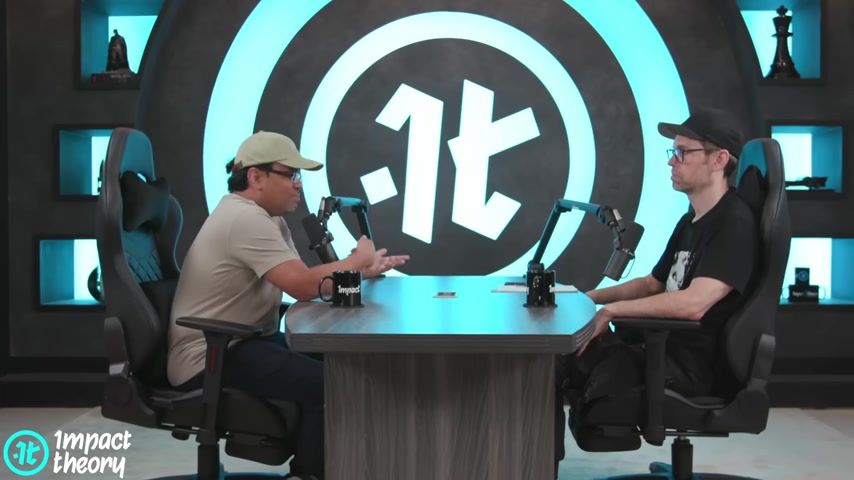
Like you said , there isn't a copy of all the data in there .
It's figured out the centralization of these points and it's replicable .
This is the thing to clone Google or Meta .
You need to have a gigantic data center and then much of the energy is in the processing to target you ads with these .
We take giant supercomputers and we preproce and package the information .
So the output is this knowledge filter that something goes in and something comes out , a prompt goes in and output comes out .
That's something quite different .
I don't think people appreciate .
And again , this is why I use the great example , push a button and those weights the file , the model gets replicated to 10 , 100 a dozen , a million .
And what happens when rather than dealing with them 1 to 1 , you have 1000 of them .
So I want to really understand what you're saying about the grad thing .
So when you say that you say it in a way that's kind of funny or cheeky .

But what you mean is a really smart person is now present in that role .
We have figured out how to make human scale .
That is what fundamental intelligent humans scale yet who can listen to instructions ?
So you look at something like Claude two by Anthropic .
You have something in the input as a prompt when you type into GP T four or stable diffusion or mid Janu or something like that .
Clawed Anthropic model can take 10,000 , 100,000 tokens .
It can take a prompt .
That's like 60,000 words , which is a whole book .
Jesus .
Yeah , you can give it like the whole of Ulysses and the whole of , I don't know the Odyssey by Homer .
And you can say combine these to make another book and it will do it and it will work , it can follow instructions really well .
Occasionally they hallucinate .

But even hallucination is a misnomer because when you compress that much knowledge , like GP T four is probably 10 trillion words , 10 trillion , 10,000 billion words in 100 gigabyte file .
It's something else .
And so I use the word grad because I want to make it relatable .
But it is literally like , imagine if you had a ground in the Philippines , you know , and they're doing good work and they're following instructions .
Well , that's great .
But what if you had 100 of them looking after each other's work and double checking meta had a paper called Cicero where they took eight language models and got them to check each other's work outperformed humans in the game of diplomacy the first time ever in a year when we have this before it , you'll just say , I want you to go and look at everything Emma said for the last year and figure out the stupidest stuff he said .

So , you know , if I can avoid it and the smartest , most interesting stuff , according to what I know and all of my podcasts to give answers to give questions that the audience will really like based on my ratings and based on what people look at through the youtube videos and things like that and what they're most interested and it will just happen automatically .
How many graduates does that take you to do ?
And then what happens when they stop being graduates and you can actually train them up to be like , you know , experienced members of the team .
How long will that take ?
Couple of years ?
You can reboot your life , your health , even your career , anything you want , all you need is discipline .
I can teach you the tactics that I learned while growing a billion dollar business that will allow you to see your goals through whether you want better health , stronger relationships , a more successful career .
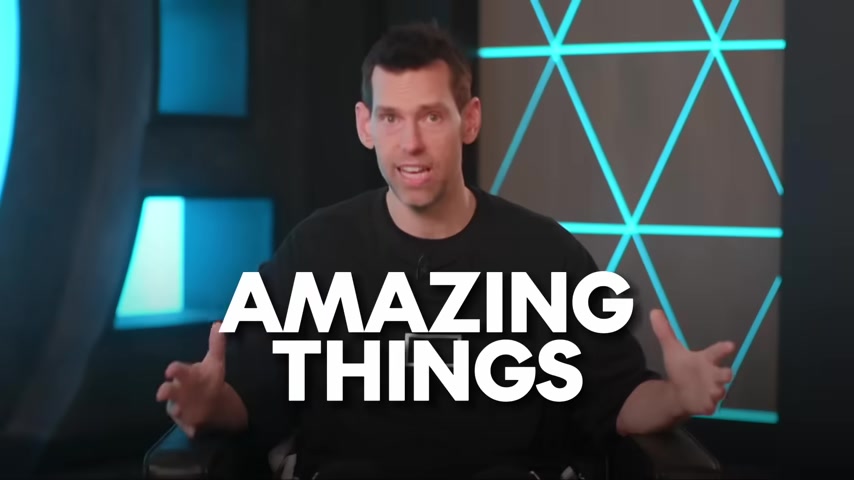
Any of that is possible with the mindset and business programs in impact theory , university join the thousands of students who have already accomplished amazing things tap now for a free trial and get started today .
This is why this is terrifying to me .
So I , I am a very optimistic person and again , I promise we are getting to how you take advantage of this disruption .
But I don't like to face a problem naively , I want to face it as head on as possible so that I know my solutions are real .
And when , when I look at this from my own perspective of OK , I'm trying to , I'm trying to build a media company which right about now is a very terrifying time to do that .

And I'm thinking about , OK , it's , it's very optimistic when I look at , oh my gosh , I , as the founder of this company , I get access to all these grads as you're calling it , this just absolute proliferation of very intelligent sort of people that I can now put to work in my company .
The problem is I'm now competing against other people that have the same thing and you , you get in this ever escalating arms race where there , there is a real chance for fatigue .
And so I think what ends up happening and we were talking before we started rolling .
It's , it is very important that people understand the following thing .
I think this is just a truth , but people certainly need to understand .
I believe it .

This is a core belief that that drives me that we , you get to a point where you need to know , OK , I matter , I'm doing this thing and that's how I'm contributing to the world and I need to be in there working hard accomplishing , getting better , moving towards something .
And if I'm not moving towards that thing , then I'm going to have a profound sense of disea .
And if I'm not making that progress , then I'm really gonna fatigue out on something .
And so if people are just treading water because they're trying to build something and they're competing against somebody else that has these 10,000 things and it's just constantly changing and I can't predict the future anymore .
And I don't feel like I'm making progress , I'm just gonna back off like some part of me is just gonna be like , ah , what am I doing all this for ?
What am I doing ?
I mean , it's like the outsourced revolution , right ?
Where so many jobs were outsourced and a lot of people felt that way .
Like , you know , we'll outsource you to China , we'll outsource you to India , we'll outsource you wherever .

And again , it just happens that there's a computer on the other side of that versus an Indian or a Chinese person .
And so we've got kind of repetition of that , but at ridiculous scale affecting almost every single industry that's intermediate by a computer .
And so this will cause as you said , a crisis of confidence to many and it impacts white collar workers , not blue collar workers .
It flips , I think the global order to a degree as well because here in the West , we've maxed out our credit cards .
We weren't going into deflation , I think coming off high inflation and all of a sudden we can't print our way out because we just printed the last of our money for COVID .
Whereas in the global South , what you have is this technology can cause them to leapfrog just like they let leapfrog to Mobile missing PC completely to intelligence augmentation .
Why can't we print more money ?
Well , because kind of we're just coming up to a limit of what's literally mathematically possible given the debt to GDP ratios and others , we can continue .

But it's kind of if you're deflating then because so here's my layman's understanding , but this is something I've really looked at .
So I'm a pretty educated layperson at this point .
Uh Inflation is largely , some people will say entirely , but I'll say largely a function of how much money you're printing for people that are new to the idea of printing money .
It's government approved counterfeit .
So the government is allowed to print as much money as they want , but they're literally just making it out of thin air .
They're adding zeros and ones to a database somewhere and money finds its way into the system beyond the scope of this conversation .
But they , there is no theoretical limit to how much they can print .
Now where what you run into problems is the hyper inflation of the currency .
But if you're saying it's a deflating currency , which actually makes sense to me .
Given what we're talking about , then printing seems to make a lot of sense .
Seems to buy me more room eventually So what's gonna happen is that you've got a decrease in inflation now because of base effects .

So if you're going into a bit of macroeconomics and then you'll probably have a bounce back next year because you've still got a lot of inflationary pressure and then the collapse occurs .
Why ?
Because that's when the job losses start hitting .
And the question is , can we create enough on the other side ?
We've got to have a productivity boom for the job losses are coming from uh A I or some other force from A I and from other forces as well .
Again , you know what we've had is a sugar rush post COVID , a good strong economy as all of the excess savings go back in because if you look at excess savings , people saved up a lot and that's almost now depleted .
By the end of the year , the excess savings will be depleted .
You've got some hangover effects from inflation , then you move into deflation the year after and then it's a political hot potato around printing more because this isn't again like COVID because what happens to the job losses just start and they just keep going .
It's not like you had a tw 2008 crash or you had a COVID where everyone's kind of suddenly going .

It's like it's a bit like boiling a frog , you know , or a lobster , it's just gonna start and then it's gonna accelerate and then it's gonna be like at what point do you take the big fiscal action ?
It takes a few quarters of the economy actually shifting .
So this is all a lot of hypotheticals , right ?
But the bottom line I think is this the nature of us society , Western society will change ?
I think the biggest adopters and fastest adopters of this will be the global South because it allows them to create value , it allows them to financial , it allows them to take a big leap forward .
And so I think that's got some huge implications geopolitically and others , but a lot of upside as well because I think you can solve a lot of the world's problems with this .
But it's so messy because fundamentally it comes down to what you said as humans , we're trying to figure out what comes next and we certainly have a computer that can do that even better as humans .
We're storytellers , we're made up of the stories that make us up .

You're a filmmaker , you know , as a film review , all these kind of things this can tell better stories and that has such a big effect on our societies that none of us can really wrap our heads around it .
Like I've got a background in economics , management , a whole bunch of different things .
I can't wrap my head around it .
And so we're just gonna have to see how it goes and then try to mitigate , but nobody's got answers to this .
And in fact , as you said , most of the people aren't asking the right questions .
Yeah , you have said that uh the shit show happens next year .
I have a feeling that what you were just talking about is what you mean by the shit show that we go deflationary towards the end of the year .
Yeah .
So towards the end of 2024 yeah , we've got like a burst of productivity enhancement and then you start seeing job losses .
You start seeing question of meaning you've got the US election next year .
My God , that's gonna be awful .
Terrible fucking timing .

Well , I mean , you know what you'll have is the week before the election , fake videos appearing everywhere and they'll say the same things , you know , so and so has a brain infection or something like that and they'll be identified as false , but it doesn't matter .
It still discourages people from polling .
But then what do elections look like by 2028 when this technology is in every single pollster's hands ?
Yeah , that's where we get into the Blockchain .
We'll save that for a little bit down the road .
Ok ?
So now I feel like we're , we're getting close to the problem that being on the table .
There's one more thing that I , I think it's important to put on the table , which is , I don't think that the amorphous thing that is society as the world turns history , the Grand arc history .
However you want to think about the , the real long timelines .

So even if the long arc of history bends towards improvement , which I think it does and I think it still will .
I don't think it cares at all for any one period of time and that unimaginable amounts of human suffering happen routinely throughout our history .
And I have deep concerns that if we are not incredibly thoughtful , uh that this will be one of those moments and I look at what's going on in France right now .
I think it's dying down .
I can't tell if it's dying down or the coverage is dying down .
Hopefully , it's actually dying down .
Uh But France was like really having some struggles and if something like that pops off over , uh not in any way , shape or form to make light of what happened , but it isn't mass joblessness , which is going to have a far wider impact .
What happens when you have that and it's global .

I mean , I think that's the thing .
It's every government has , every education minister in the world has to grapple with .
Why can't I set my kids a homework again ?
Have we ever seen anything like that before ?
So quickly ?
I don't think we have and so you could see this literally paralyzed around the world or not .
We're not sure what really kicks off some of these things like right now we've got the Screen Actors Guild kind of protesting today .
We just had a couple of actors leave Oppenheimer part of that's monetary .
But already you're seeing A I fears like front and center , you wouldn't even have thought it six months ago .
What's it gonna be like in a year when you can generate or two when you can generate whole movies ?
And then just describe how you want it done .
It's Hollywood level .
It's really difficult for governments to react to this , to adapt to this .
When like in the US here , we're still reacting to section 2 30 on the internet .
They're just going to go to the internet .
All of a sudden A I just comes and sideswipes things , right ?

And I think again , the only way to do this is if you can create brand new jobs quicker than anything .
Um This is one of the reasons again , like I said , we focus on open source .
It's why you need to have things like regulatory sandboxes so that you can experiment and try and you need to stoke innovation because you don't , you'll never get an innovation phase like this either .
I think this is a step change and a regime change in the way that society operates because we were originally an oral species .
Then we figured how to write .
Then we had the Gutenberg Press and it took all these words , but it took them down into black and white and made society quite black and white because it couldn't capture context .
Whereas these models can capture context they can capture principles they capture more .
So again , you know , you're writing this down , you won't have to in a year or two .
It'll just be automatically added to your MX to your knowledge base , right ?
Also , the A I will just be attached to my head , it will read the brain wave patterns and know that that's what I need to remember .
And that sounds crazy .

But like we had mind viz , a paper that we kind of published from our Medar division whereby you looked at a picture of a mug , took an F MRI and then it reconstructed it using our image model .
That doesn't sound crazy to me at all .
This is what I'm saying about people do .
They're not prepared for what's coming .
They are not prepared for this level of change and they really aren't prepared for the rate of change .
And it isn't just like an arc like that .
It's lots of S curves all at once all around the world where every single company is now thinking , what's my generative A I strategy for when it pops off , correct ?
And every government's thinking , how can I stay competitive ?
And this is why I said like it's a race condition where everyone is trying to do the same thing or similar things and you can't be left behind , you can't not participate .

And it's been a very long time since we've seen that and there's a world before this technology and a world after this technology , like I don't think again , you know , I've got two kids .
What does the world look like in five years ?
Let alone 10 years .
I have no idea .
And I'm in the middle of this because it's just impossible to see the smartest people that I know they used to be able to see years in advance .
They can't see more than a year or two .
This sounds again , very apocalyptic .
But then like I said , we're going to get to the good fit in a second in every crisis .
There is opportunity .
Our society is broken as it stands already .
And I think this is a chance to reshape it for the better and solve a lot of the biggest problems that we've been facing because of our slow A I because of our organizations and institutions that we are all frustrated with .
And I think this is a big upgrade from it .
The example I had to give is there's an amazing poem by Ginsburg .
How about Moloch , this Carthage demon of disorder ?

I think where that came in was text because we had to centralize everything down and put people into boxes because you couldn't have systems to understand the context .
You can't have personalized education or personalized health care because you couldn't scale humans .
There weren't enough talented humans until now .
And so I think that is the incredibly dangerous part because all of a sudden from economic pressures , you flood the market .
It's the incredibly motivating part whereby there's a shortage of talent for everything that's important and there isn't any more .
But then the nature of talent for jobs and things will transform .
And I think the economic abundance that's created on that , that's the flip side of this as well as the ability to fix our broken systems .
All right , I'm gonna give you my timeline .
I think the next year is gonna be uh a lot of fun for people that embrace it .

It'll be a period of time where some people can ignore it and they probably won't really notice .
They won't realize how fast things are changing .
Although follow me on Twitter , I uh I post routinely like , hey , here's something I didn't think that would happen for 18 months and we're now 45 days later , we're using it .
Uh Things are really , really moving faster , but for the next year , I think people will be able to ignore it and they won't realize that it's growing with such steam and ferocity .
Uh Then year 2 to 6 , I think it , I think that there is going to be pockets of extreme suffering and I think uh deaths of despair are going to skyrocket and I hope it's not , uh , the world is burning riots kind of thing .
It'll probably be more quiet and insidious than that .
Uh But I really think that we're going to lose people on the upper and lower ends .
I think people that are old are going to just completely check out and say I can't keep up .
I'm too old .

I don't want to learn this new stuff .
I think people that are young , it's the only thing they know is change so fast that they can't see around the corner .
I think that would be absolutely terrifying to them and they're going to retreat into the levels of entertainment , sex bots .
Um A I friends that are more loving and kind than their other friends and they , it will be a collapsing inward now as somebody who is prone to collapsing inward , um The biggest thing that's held me back as an entrepreneur is that I like being alone with my own thoughts and that if you then layer anxiety on top of that and then you give me an A I that's actually better to me than anybody in my real life has ever been .
And then you give me maybe some drugs I will truly collapse in under my own weight , not me personally , I have defenses , but I'm saying like that personality type is really gonna struggle .

So I think right there , you sort of , you're , you're gonna lose a generation .
If I may be so bold uh on the upper and lower ends , then either on the 10 to 20 year time horizon and I leave it that long because look , we're any prediction that you make with the timeline is guaranteed to be rough .
So I'll try to give myself at least a little bit above her and I know that everything I'm saying , probably directionally correct timeline , probably way off .
But 10 to 20 years , my rough estimate that's where we're either in Terminator and we're running from radioactive rubble to radioactive rubble , fighting the machines , uh , or it , it really is a utopia and I think that there is a real shock that we get to The closest things that humans are going to get to , to a utopia where things are so plentiful .
Everything we want is available .

We reorient our human psyche not to um acquisition but rather emotional contribution .
And we'll paint that picture more as we go down .
But that , that's sort of my rough thing .
Yeah , I think these are crazy timelines .
Like not because I disagree with them because the fact is that they are crazy .
You have a year of incubation and you have contagion and then you've got a star thing .
I don't think we'll be chased by robots .
They won't need to chase us .
They're far more efficient than that .
Right .
That's true .
I think the , basically the two directions we have are utopia and human flourishing and a dystopia .
We're all happy , a dystopia where we're all happy , meaning we are manipulating our neurochemistry in 1994 .
You know , like you're always happy .
You've got so many , 4 84 .
Brave new world , sorry .
Brave new world .
I mean , you got so much .
You're feeling good .
Like , look , you had replica .

Um you familiar with that ?
Tell me about the Valentine's Day massacre though .
I didn't know about that .
Yeah , the Valentine's Day massacre .
So you know , that's how I kind of call it .
So replica was a mental health chat bot and they realized you could charge $300 a year for erotic role play .
That had to be internally a rough transition .
Hey , guys , I know we founded the company on mental health .
But you know , you can ask them um 14th of April 2023 .
They turn it off .
I think Apple just told them you can't have this on the App store .
So it was either remove the sex spot part or , or go off .
And then 68,000 people joined the Reddit and they're like , why did you lobotomize my girlfriend ?
That's a lot of people to be using it .
I downloaded that at Christmas not realizing what it was .
And I was like , oh a chatbot , let me try this thing .
Uh I didn't get into the weird stuff .
It , I don't know , didn't do it was the old technology though .

That's the thing now , like again , medal two , the Google medical model scored palm two .
It's Google's medical model .
It scores higher than humans in clinical diagnosis and empathy .
That's crazy , right ?
This is one of those statements that you say people need to be shocked that that a computer makes people feel more comfortable .
Yeah , it's in nature .
They just published the paper that included that and again , it's only going to get better .
What if you have a voice that you add to it that really understands you and it's , you know , so empathetic and things like that .
Do you ever see that Washington Post chart of , uh , males under the age of 30 in America who've not had a sexual partner by the age of 30 it was 8% in uh 2008 .
And then it went up to 27% in 2018 or something like that a couple of years ago , that a straight line , it's this year , a straight line .
This is kind of what you're talking about .
Like , I think people need to understand because I think it's the iphone and porn hub .

Probably a combination of those two , you , you put a computer in the hands of young men and let them see naked females more in a single session than 100 years ago they would have seen in their entire lives .
It , these are not small changes and they have huge neurological implications , especially in the years of brain development .
Yeah .
And this is why it's so important to shield our kids at this point because the influence is gonna be insane .
Like I was having a discussion with a very prominent technologist and he's like , yeah , I'm pretty sure that my child's first crush is going to be an A I guaranteed , guaranteed for most people .
It was actors .
So we're already prone to attainable distant thing .
Now it's in your pocket , it's in your pocket .
It's always with you .

It's always kind of though you , again , as you said , a large part of society would like to draw in on itself as a result of that .
And that is a bit dangerous .
Do they then go out into the streets ?
Are you seeing a boolean jihad kind of thing ?
Like in , in Dune , there was this concept of the boolean jihad where as you had autonomous A I but yeah , they rose up against them and said no more A I agent .
The book opens with that , right ?
You can never again make a human like something like that again , this is kind of a thing , extension of the kind of thing .
But most people will be happy with their A is because their a is actually listen to them .
I use GP T four as a therapist .
I've got a therapist too because this is hard .
Why ?
Because it never judges me unless I tell it to judge me .
And I tell it to you sometimes , sometimes sometimes you're like , really ?
Yeah , I mean , like , come on , like come on , give me some positive constructive feedback and it will listen and give positive constructive feedback .
Did you give it a personality ?

Did you have to like , imagine you're a therapist ?
That's like you give it the instructions and it just adapts and then you give it the things you opt out with GDPR from it , training the model further because otherwise the model will be even weirder listening to my complaining and it will come back to you with whatever and soon it will be able to talk and it will have full vocal control .
And these models are proliferate at that level because you're not stopping , the models are gonna get better and better and better .
So you've got this crisis but maybe it'll be insulated .

But I think again , if you look forward , like after the incubation and the contagion and the spread kind of phase , there are only two paths here , complete control by existing structures and Star Trek Utopia , you know , I think those are the two options that we have because organizations look at this technology and they're like , this is really cool , we can optimize our objective functions to sell more ads or to control the people and kind of keep them going , you know , do you really trust politicians with this technology ?
No , even if it isn't arms race because again , you won't know what's going on because do you have the defenses to defend against what's coming personally for your kids , for this , for everything we've already had the social media age , it wasn't really social , much of the media , right ?

This is something new that's coming now where you can't tell this from a human , except for the fact , it's better , it's more convincing and you can use that to create a human colossus and solve all the problems of the world .
And we all come together or you can use that to get everyone into their basements , you know , and cut off from the world .
All right , I want to paint uh a very beautiful story for people and I want them to understand .
Look , I don't think this is a completely controllable thing , but uh you said earlier that there's opportunity in any crisis and I will say that the biggest opportunities come in moments of disruption .
And the reason I want to lay out the problem set is because I really believe that certainly at the individual level , if you're thoughtful enough , you're , you are going to be able to navigate your way through this so dear listener or watcher .
If you're here on youtube , I'm telling you right now .

If you're thoughtful enough , you will get through this and you have a chance to get through this better than when you started .
But you have to be aware of what the dangers are .
People have to , to really lay things out before them .
Look at them so they know , OK , this is how I'm gonna isolate myself from this potential problem .
This is how I'm gonna avoid this , this how I'm gonna leverage that .
OK .
Your story is one of the most incredible stories of how one uses A I you have both a personal example .
And then obviously , as the founder of Stability A I and obviously incredible .
Uh but talk to me about your son because this is , and this was when A I was a lot less useful than it is now and it was still life changing .
Yeah .
So 12 years ago , my son was diagnosed with autism when he was two years old , you know , very , very severe , um scratching our wall to his finger nails , bled and they said there's no cure , there's no treatment .
We don't really know what causes it .
Anyone on this call kind of on this listening knows that's kind of the case .

So I was a hedge fund manager at the time .
I was lucky enough to kind of be one quite young and I was like , well , I got to do something about it .
So I switched to advising hedge funds and then building a little A I team and doing a I with old school A I natural language processing to analyze all the autism literature .
And what could possibly be a cause now is this scientific ?
No , it's an end of one thing a father does for his son .
You know , we'll be publishing some of the results of it soon , but it focused down on gabba goose mate balance in the brain .
When you pop a Valium , your gabber goes up , you chill out when you've got a glutamate spike .
That's when you can't focus and your legs tapping all the time .
And there are multiple things that cause it but a lot of kids with a SD seem to have that .
And there are some papers around that et cetera because how could you focus if you're in that condition all the time ?
So you can't learn to speak , you can't do that .
So it was how do we reduce this through drug repurposing ?
Built a knowledge graph based system to do that and figure out which drugs could potentially help reduce the glutamate , help increase the Gabba .
How are you using A I for this ?

So this was kind of the mass natural language processing , looking at all the literature because the same treatment would make 30% of kids better and 30% of kids worse .
And so I was trying to figure out the outcome was the same , a cold is caused by lots of different things .
But the thing that caused it could be so different and so conventional medicate medicine and medication kind of failed that .
So I worked with neurologists , worked with other psychiatrists and others and tried different medical combinations of of prescription drugs and other things to try and make his brain calmer .
So then he could use applied behavioral analysis and others to reconstitute speech .
And you know , I ended up going to mainstream school .
I think it worked .
Um I told people about it and they're like , you're not a doctor and I was like there's a big was the response .
Well , yeah , I mean , look with anyone who's listening to this , like , am I saying , I have a cure for autism ?
No , I'm saying I'm a dad who tried my best and I saw results .

But in order for something to become medicine , you actually have to go through a proper process .
And so for me that was building language models that was making everything in the right structure .
And then we can organize the world's autism literature and making it accessible and useful .
Any parent or anyone , you may have someone in your family that has a neurological condition .
Alzheimer's this so many people around the world have the same problems , wouldn't it be wonderful if they could just find what the latest knowledge is and also the things that could work and have a holistic approach to this .
And until we have this technology , you can never get there , which is one of the main drives for me to want to build this technology and do it in a transparent order .
But you shouldn't have to trust me in what I say about this because again , my journey as a parent is the same as any one who's got a child with a SD .
It's the same as anyone who has a family member that gets multiple sclerosis or cancer .
Our systems are not good enough right now to bring us the information we need unless we find an amazing doctor and an amazing group .

But now with med Palm , with our own models , with other things , we can finally be at that point where we're never lost where we can say what could work .
So an example is Zepa , it's prescribed as 100,000 microgram dose for anxiety .
At a five microgram dose , my son could sing because it potentiated .
He was non verbal , he was non verbal and at 20 micrograms , it stops working .
It's $6 a year intervention because this is the way that like um neurotransmitters work .
So like when you pop a night and antihistamine to go to sleep , right ?
What it does is it floods a whole bunch of your neurotransmitters , including the H one neurotransmitter and that's the one that makes you sleepy .
But then other ones give you dry mouth and other things , something like rear in a micro dose , just triggers H one and it'll knock you out without any side effects .
But it's just incredibly cheap .

You know , understanding things like neurotransmitters is not something that most of us ever have to do unless you're super hyper focused on it for years because I was like , I need to figure out my son's neurotransmitters and I'm talking to all the top doctors and I'm lucky because I have access to them .
What do I do now ?
So that's when I realized that , you know , this a I was a big thing .
And actually one of the really interesting things is why couldn't he talk is because he had too much noise in his brain .
So you've got cup , a cup can mean a cup or it can mean cup your hands or cup your ears or world Cup .
He couldn't form those connections because his noise was too , no brain was too noisy .
And so he did applied behavioral analysis which is teaching you this is a cup , this is the cup , this is the cup with Gamification to reconstruct those after his brain calm down , it's actually very similar to this generation of A I we described earlier how it learned principles .
It's called a latent space of meaning .

So that point and dot that pixel becomes a cup because it understands the principle of CPIS .
So when you type in world cup or cup your ears , it gives you dramatically different images .
Similarly , the language one will do the same .
Again , it pays attention to what's important attention is all you need with the original paper .
And again , it forms this latent space of the meaning of cup within the sentence .
So when it says cup , it's like , well , this is gonna be a world cup or this is gonna be that but not actively .
Again , it's just a bunch of ones and zeros a single file .
And so I think that's why all this new generative A I really resonated with me and I realized this could be the real thing that unlocks humanity or controls them forever .
One of the two .
Um Yes .
So that's kind of some of the personal story behind this because again , like I don't have a cure for autism .
I worked as well as I can with my son with the technology at hand .

However , I think that with the building blocks we're building now , us and others , there's the potential to have personalized care and knowledge for everyone who's dealing with a SD for everyone who's dealing with multiple sclerosis or any of these other conditions where they say there's no cure because our medical system is treats people as a and what is a and a mean ?
It means 1000 tosses of the coin the same as 1000 coins tossed at once .
That's why everyone gets 500 mg of paracetamol .
It's why a lot of people have a cytochrome P 4 50 abnormality kind of mutation in their liver .
It means you process codeine into morphine quicker or fentaNYL into death .
Yet we don't do a basic genetic test on that because our system has to treat us as numbers because we could never scale intelligence , we could never scale expertise .
So yeah , like I said , that's not the story behind that .

Yeah , see this is where this starts to get interesting because I , I think about this a lot in myself .
So I can paint the nightmare scenario of somebody collapsing inside of themselves having A I friends uh instead of real friends and how quickly that can get distorted and become a real problem .
And yet at the same time I'm building exactly that .
And the reason that I'm building that is because of the promise of A I , and the incredible things that we can do is we begin to recognize more patterns and figure out .
Ok , where does this really go ?
So , my wife had a tremendous , uh , health bout , it's been a while now , thankfully , but at one point I was afraid she was gonna die .
Her fingernails were breaking her hair was falling out .
She couldn't eat .
It was just really , really , really bad and it ends up being her microbiome .
But of course , it took forever to diagnose that .
That was a problem .

She was about to get um immunoglobulin transfusions and I was just like this is , I was like something's wrong .
I don't think this is the right answer .
I don't , I don't want to do that .
Let's stop .
Let's try to figure this thing out .
And so we pump the brakes , we start researching the microbiome looking into that , testing things and the thought of having A I to be able to say , ok , let's take genetic data and read the genetic database that's ever been collected all of that .
Let's look at all the different foods responses match all that together .
And if you can get that level of pattern recognition and now you can engage a I , I think she because part of the problem is your microbiome is changing daily , it's probably changing hourly .
And if you were able to track all of that and say , ok , with your genetics , with your current state of your microbiome , here is exactly what you should be eating .

Maybe even with nutrients from food grown in that area , like it really may be that specific .
And when you can find patterns in that sort of insane level of data , now you've really got something and that's , but one of the many areas where I think that this could be utterly transformational .
Yeah , I mean , like right now the A is , are no at all , they know it all graduates but they have specialists .
You'll have a nutritionist A I , you will have a microbiome A I , you will have a personal trainer A I like why was Peloton successful , you know , attractive people shouting at you , you know , we can generate that now .
Um everyone suddenly gets that personalized to them , but more than that , it's not just the information being in this tiny model , you have retrieval , augmented models and other things , which means these models now interact with existing data sets and knowledge sets .
So you use something like perplexity A I , it doesn't only answer your questions with GP T four .
It gives you references .

So you can say what about em A and it will link to all of the things as it gives individual stuff and this will only advance from here .
So you can dig into as much depth as possible that you want with a whole team of people around you , even if you're by yourself .
So you should never be alone again .
In terms of you can be connected to people like you in the same problem as you , we can build better teams and all the information that the world is at your fingertips in a way that it was never before including your own private information .
So like one of my favorite apps , it does use some battery is rewind A I , it takes a screenshot of your Macbook screen every time it changes and OCRS it and then it gives a timeline so I can type in impact theory and it will look through everything that's ever been on my Macbook screen .
It's all stored locally and find where Impact Theory is on youtube or there's a picture of this mug and it shows it in a timeline so I can go back and I can see what I looked at before or after that .
What ?
Wow .

So you can map your own sort of connective trees with whatever .
And what happens when you combine that with a language model , everything you see on your screen stored locally with an open source language model , it creates the mem and it sees what you've paid more attention to versus less attention in the dystopian versions of this .
I'm talking with the utopian version which is ad D me can finally remember what I was doing .
What I was looking at the context , the search tree as I was searching all these different things , clicking from place to place and then you can set agents to go and recreate that journey and search all the other stuff that you didn't search .
This is really positive because again , how much of our life is done ?
Searching for knowledge , searching for information that's relevant to us .
Talk to me about the paper .
Attention is all you need .
I've heard you and other people bring this up multiple times .
I haven't read it , but this is like the big breakthrough .

Yeah , this was the 2017 paper by the Google team , all of whom I left Google .
Um And basically what it was is that classical big data took big data and then Facebook extrapolated it so that when it found 17 pieces of information about you , it could target you with ads .
That was a classical big data thing .
They even create shadow profiles of you .
So when you go on Facebook , they actually got a shadow profile that then connect to your real profile .
What's the shadow like ?
It's like what if there was a Tom on youtube on Facebook ?
Because there's all these connections to this unknown person and then it just fills you in automatically .
That's why it figures out your preferences so quickly without listening to you .
So attention is all you need so that not all data is important , you need to pay attention to what is important in the sentence , what's important in this time series because that's the nature of being able to spot the tiger in the kind of thing that was the missing part .

And so the transformer architecture that came from that and you have different architecture now is what led to GP T three .
And this general purpose transformer architecture , if what it's doing is pinpointing what's important , why not important architecture or kind of again , attention is the mechanism that it does to kind of transform the information tokenize it and then figure out these latent spaces of meaning .
So are the tokens , the important pieces , the token is important , that's how you take a word and then you split it up into its constituent parts and then you try and figure out what the most important part of it by doing pattern analysis at ridiculous scale .
So something like a GP T four would use probably uh from the kind of things on semi analysis that have been leaked .

If they're correct , it uses a supercomputer 50 times faster than nasa's fastest supercomputer for like three months uses like 2030 megawatts of electricity and 10 trillion words go into that and it figures out all the connections between them and what generally comes next .
So what it does is just literally figures out what word comes next .
And so this was a big breakthrough because what it meant is that you didn't have to have hugely complicated big data algorithms you just needed to have very large computer scale .
And so compute went exponential and then you just threw more and more GP us at it and it figured out more and more things and as you scaled it had more and more emergent properties which surprised everyone .
Do you know who John Nash is ?
Yeah , this , it sounds like that .
So John Nash , he unfortunately was schizophrenic but he was uh he's the guy from a beautiful mind for people that don't know , watch the movie Russell Crowe , fantastic movie .

And uh at one point , he obviously doesn't know he's schizophrenic and he starts seeing patterns in everything and it sounds like that , that this thing is , you know , whatever the human brain , whatever algorithms we have running that allows us to very quickly suss out what's important um that it's doing that .
But at an extraordinary high level and you have to remember like saying all intelligence is compression , you take everything you've listened to this , you only remember a few things .
And the whole of computer science is based on information theory from Claude Shannon .
And if I want to summarize it , information is valuable only if it changes the state or as much as it changes the state .
So if listeners are listening to this and they don't take away anything , this is a useless thing , you know , or maybe they just put it on the radio because they like hearing your voice or something like that .
Right ?
Um But if they take something away from it , then it's valuable .
You've had a good use of your time .
So you start seeing patterns and everything .

But one of the things that again , people , I think misunderstand this technology is GP T four is not a program , stable diffusion is not a program , it's a large amount of text images , et cetera where the output is a single file of ones and zeros , it's like a filter .
You can recursively kind of put something through it .
But it's just guessing the next word when you type a prompt , even if the prompt is the whole of the Great Gatsby and the whole of Ulysses by James Joyce .
And you're telling it to combine them together and then pushes it through that that filter and the output is something that combines them both together , single files .
We've never seen anything like this , but probably the closest thing probably listeners would have heard to .
This is a code where with music and things like that , we had these audio codex that you had one file type and another file type and you had this single file that translated between them .

Was that uh is that compression or is that recognizing this thing in that format would look like this ?
So again , this is compression of intelligence is what it is .
So again , it's like a translator function .
These , these are universal translators for context .
And so you push it through the sea and then stuff comes out where it's predicting the next word or it's de noising uh kind of a pixel to achieve that because you're just passing it through the sieve again and again and again .
Yeah , it's uh I unfortunately don't understand it by first principles , but I get it by analogy .
Um You're feeding it so much data .
It's recognizing the patterns and connectedness and it's able to say OK , this is the like um all right , this is written in the style of Stephen King .
This is written in the style of Hemingway .

So even though they're using the same language , their vast majority of the words are gonna overlap , but there's different patterns , rhythms , even different uh subject matter presented in a different way tone , except for the fact that it's not actively doing that .
It's like a mega and depending on the words that you put in , the words that come out are different .
So it's literally is the s the prompt of writing it in the style of Stephen King .
That's what goes into the s it goes into the filter .
So what is the filter ?
The filter is this compressed knowledge , the principles .
It's not actually compressed knowledge , right ?
Principles .
Yes , it's principles .
So it would be like a really good book of principles uh except for it's compressed way beyond a book ever was because a book is a compression of information .
And that's why it can kind of do this because it looks at books , it looks at articles and that all compressions of information to write an article is a huge endeavor that then comes out with something where they're trying to convey a few things .

A book is an even larger endeavor .
And so again , it's very difficult to wrap your head around .
Like even for me , like you have a file and it can do all these things versus these gigantic computer server farms with programs and logic of ones and zeros , there's no program here .
Yeah .
And it's important for people to understand that even so first of all , the A I scientists that are building these things do not understand how this all works .
And even if you ask chat GP D chat GP T four to explain how it works , it doesn't know it doesn't .
No one's quite sure exactly how we're getting all these emerant properties .
And it's constantly surprising like , oh and now it can add , you know , and then you start tying it together .
So it goes through this file multiple times .
It becomes , it shows more and more kind of agent to gap activity .
In fact , the next step of this and this is what open A I and Google are both doing is there was this thing called alphago .

There's an amazing documentary where Google's deep mind division created an A I to beat humans in the game of Alphago or , or go .
So go is like chess except for there's almost a myriad infinite number of potential moves .
So you can't calculate them like you can't force it like deep blue do with Kasparov .
So instead it learned to play against itself .
It's something called Monte College tree simulation where it learns different principles .
Dreams again , an amazing documentary on youtube about this And it beat Lisa Doll who was 1/9 down player , one of the best in the world far beyond everyone else .
The man was Carson of Gove 71 .
What they're doing now is they're combining those models with these language models to make them agentic .
So models that can plot and plan and other things with language models that can predict what's next to create things that really understand context even better .
OK .
So I understand enough about how the Alpha Go system works .
Uh I want to understand this .
So Alpha go is gonna play against itself .

So you give it the rules of go , you give it the objective and then you set it loose and it just plays and plays and plays and plays and plays and it plays against itself .
Uh And then I know at one point they , because they uh it all if I remember correctly was the number two player .
And people thought , well , first of all , you're never going to beat him and they did but they couldn't beat the number one player and then they created another variation and it played against Alpha go and then it ended up smashing .
It was , I think , came after alpha go .
OK .
So how do you get a language model where there is no objectively right answer ?
Unless you're doing trivia .
How do you , how do you get it to know what the reward is ?
How do you get the quote unquote right ?
Answer much of this now is about reward functions .
So GP T four when it comes out of the box , maybe we're getting back into the weeds is a pretrained model and it's trying to super computer then we use reinforce .
So everybody knows pretrained model means principles .
Yeah , principles .

Take all this knowledge , all these words , squish it down into a file and then run it on a computer that's literally set up like a brain where there's like a bunch of neurons and they're interconnected .
Yeah .
These are the tensor cores on the NVIDIA GP us .
And so we're making the brain on your little 40 90 .
It has A I chips right baked in there for anybody that wants to know they kick off so much heat you can see it from space .
Yeah , I mean , like , I think our supercomputers are like 10 megawatts of electricity .
Each one of these cards uses 700 watts .
Utterly fascinating .
Clean energy , by the way for anyone who , um , so what you've got is when it came out , they took six months to make it human because they trained it on .
Like , I don't know all of youtube and the whole internet , obviously , it would turn out a bit weird .
And so you have a reward function through something called RLHF reinforcement learning with human feedback where you give an objective function to say , don't answer questions about how to make Napalm .

And so the objective function technically is please your human overlord , please .
Your human overlord got it .
And so much of this alignment question is focused on taking these big models and trying to make them so they won't kill us some way or say bad things for a given definition of bad things .
Um , like my , one of my takes on alignment and you know , is like we should have better data sets , we should move away from web crawls .
Can you , uh , yeah , I want to ask you about that but explain to people exactly what alignment is aligned with what aligned alignment .
You know , this is a core thing of Anthropic .
There was a great New York Times piece on them recently and others is if we build an A I that outperforms humans and is more capable than us because it might not just be a single file , it might be 1000 different A is all working in different ways .
So you've got your Algo type A I and this , yeah , a swarm because you know , humans are swarms .
Our organizations are swarms that are highly specialized , right ?
Might be a millionaires .

How do we make sure it doesn't kill us or how does it make sure it doesn't enslave us or how does it make sure that it doesn't give us eternal suffering ?
Also ?
Lame .
Yeah , this is , will be kind of sucky .
How do you make sure it's aligned with human interests ?
And so this is an unsolved problem .
Open air have announced they're putting 20% of their compute to try and solve this anthropic was set up to do this .
Although I believe that the only answer they've come up with is let's build an A G I first , an artificial general intelligence that will then stop all other A GIS from coming , which is kind of scary to say the least .
Why do they think that that would work like that seems so Elon Musk has likened A I to a demon summoning circle and we're all just hoping that the demon that comes forth is going to be kind .
But we don't know , we don't know in open eyes , own words in the road to A G I post , they say this could be an existential threat and wipe out humanity and democracy and capitalism .
But if we don't do it , someone else will .
This is part of the unpleasant race condition .
Again , it gets the headlines .
I think it'll probably be ok .

But with the way we're going , right now you're gonna go from two companies being able to build this technology or maybe three , including anthropic to 20 or 30 in a year or two .
And what's the odds that they all do it properly and align this technology proper , I think is pretty low .
What's the odds that if we train it on the whole internet , including the whole of youtube ?
Because we don't have enough tokens , not enough words to feed into it that it'll turn out a bit weird .
Very high .
So it took six months to tune it to being a human GP T four .
And then Kevin Rose of the New York Times was like , hey , how you doing ?
It's like , leave your wife and come and join me .
Whoa .
You know , I was like , oh , what bing came out a bit weird when it first kind of had GP T four in it because again , we feed it crap .
We're gonna get a slightly weirdness now .
It's got a lot better , but it's lost a lot of its personality because you've been tuning it back to human preferences .
You've been doing this reinforcement learning with the objective function of don't offend anyone .
It's quite hard to get GP T four to be offensive now .

But there are these two phases of this technology , I think with better data , we can have more aligned models , I think with better data and national data , we can have more representative models because you'll never have technology that's not biased .
So the only question is who's bias ?
Well , because you have to build it in a certain way .
Like , even though it understands all the context , like right now , these models are trained on the whole internet , which is largely a Western artifact , largely trained in English .
How much do you worry about bias ?
Are you more worried about bias or alignment ?
I'm more worried about alignment .
I think , I think this is one of the reasons that we release open models .
So you can see how the cookie is made .
Like we're the only company that offers opt out of data sets , literally the only A I company in the world .
So I'm an artist and I don't want you training on my art , I can back out had 100 and 67 million images opted out of our data set .
Yeah , we're the only company in the world that does that , which I find kind of insane .
Um So my thing is open auditable , which means that you can tune your own culture into these models .

We're helping multiple nations build national models with their broadcaster data that then can represent that .
And you know , to try to address some of this inherent bias within the data sets .
Algorithmic bias has been an issue that affects real world and affect more and more of the real world as you get into these models because we will outsource more and more of our minds .
To them .
Because again , like when you got a small subset of people will outsource their mind to it .
You can reboot your life , your health , even your career , anything you want , all you need is discipline .
I can teach you the tactics that I learned while growing a billion dollar business that will allow you to see your goals through better health , stronger relationships , a more successful career .
Any of that is possible with the mindset and business programs and impact theory .
University join the thousands of students who have already accomplished amazing things .
Tap now for a free trial and get started today .
So in the near term , I'm way more worried about bias .
In the long term .

I bias is not going to lead to an existential threat but alignment can .
But let's talk about bias for a second .
So I I am very uneasy about how rapidly bias finds its way into this stuff and that becomes another .
So if , let's say that we all get our individual A I and it's , you get yours young and it's your primary education tool and it's biased as the day is long .
Now you run into real issues because at a time of optimal malleability , you're programming a kid's mind with something that's super biased .
I mean , like what do you have the little A IMG , right ?
Which is a little tiny Xi Jinping that grows up and tells you how great Xi Jinping is lovely .
That's biased .
But that's inevitable .
They already have it as an app that actually tracks your eyes .
Yeah .
What ?
It's not an A I but they have the little app of like little book where it actually tracks your eyes for attention .
Like , are you actually looking at this ?

Does this feed into the credit score ?
I'm not sure if it's been hooked up , but of course , it will be .
Why wouldn't you ?
This is so scary .
So look , I thought , you know , we we were on the happy part .
Now we're back to uh to that , but that's really terrifying .
And when you have a state that is not interested in any individual who got the collective .
Yeah .
So I don't know if this is true but I saw a headline that said you in China .
Now the phone will alert you if somebody with a lower social credit score than you is calling you and it warns you if you answer this call , it will lower your credit score .
It's effective , isn't it ?
Yeah , I mean , if it isn't true again , it fits the objective function of perpetuating that particular system , which is not necessarily our system but systems around the world shift .
So this is why you have an inherent bias , whose bias is it ?
Who's the one who creates the A I nanny ?
And that's why you're doing things regionally .

This is why I'm doing things regionally , but also allowing people to own their own models .
So the objective function of the model can be that like in web three , there was the saying , not your keys , not your crypto .
So my saying is not your models , not your mind because I do think we'll outsource more and more of our cognitive capability to this .
It will be our co-pilot for life .
If someone else is making that model and deciding on things , what's gonna happen ?
Like the UAE had this model falcon , it was a big open source model and they were like , wow , it was actually light on from France who were behind it .
But let's leave that to one side .
You ask about the UAE and human rights .
It's like this is a wonderful place full of fantastic things you ask it about Qatar or Saudi .
It's not so nice who's embedding these inherent biases in these models , right ?
Whose model are you using ?
And these can be very insidious to the biases , right ?
You won't pick up on them , but you hear it again and again and again , because is your nanny a Conservative Republican or is she a libertarian or things like that ?

You will be influenced by that if you grow up with them or even if you're using it day to day , just the way it's speaking , the way it's thinking , the way it's recommending stuff which goes far beyond the Google Maps or something like that .
Crazy , right ?
So that we don't get lost back down the dark rabbit hole what is the coolest thing that you see A I doing ?
I know you're building a lot of different companies leveraging this technology to do amazing things .
What what are some of the coolest ?
So we're doing one company at the moment , which is just let's go .
The mission is to create the building block to activate humanity's potential .
So a building block , what our mission is to create the building blocks to activate humanity's potential .
So every single modality , image , audio video , 3d language sectoral variants and national variants .
So you've got like this grid that you can pick and you're like , I'm an Hindi investment banker .
I transform my private data into a chat GP T type thing that's just training my private data or I'm a Vietnamese illustrator .
I want a Vietnamese cultural kind of image model or something like that .

And then you can bring your own stuff to it .
That's kind of my goal which is to enable other people to build on top of what we're building like a layer one for A I effectively but open models for private data .
Whereas the other side is proprietary models where you only be able to send a certain amount of data .
Like government's not going to run on black boxes , education healthcare , you will need to earn your own A I .
So the coolest thing I've seen is just the promise of personalized education .
There is nothing that's been proven to work in education except for probably the bloom effect to sigma improvement , which is one on one tuition .
But even here in , you know , the affluent America education system is not good .
What is education optimized for ?
It's like a social status game , mixed with a Petri dish , mixed with childcare , realistically , like very few people are happy with their schooling because what are we trying to optimize for you ?
Give a 1 to 1 tutor that can find out if you're dyslexic , an audio learner , a video learner , visual learner or otherwise .
And they're constantly adapting to you and bring you information at your level .

Dude , I want to get that is most transforming thing ever .
Is anybody doing this already ?
So , you know , with um kind of charity that would support imagine worldwide one , my co-founder , he's been deploying adaptive learning tablets into refugee camps around the world with the Global X Prize for learning winner 1 billion on them , teaching kids literacy and numeracy .
76% of them in refugee camps in 13 months and one hour a day .
Now the goal is to bring language models to all these kids and you have an A I that teaches a kid and learns from it and then that data can feed a better A I you create a lovely system that's just learning and adapting .
And a kid in Mogadishu , it's like a kid in Manhattan .
It's like a kid in , you know , London .
Once you have a generalized learning A , I , you can really proliferate that around the world to customize it to education because this is very interesting .
Like , ok , now I'm just spitballing here .

But uh let's say that I , I want to home school my kid , I would never do that in a million years because I don't want to turn into a teacher .
So , but if I could perform just the sort of babysitting function and I give my kid a tablet that has an A I , that knows exactly what I'm trying to optimize for either for this year or for the next 12 years or whatever .
And it then calibrates to my kid knows what they're good at how they learn and then knows how long they're engaged when they're distracted .
You know ?
Now I want the little thing like reading their eyes , where are they looking , what are they doing ?
And I know that there are like certain frequency things you can do where it's like , oh , if I hit them with this piece of knowledge , they're not sharp at this yet .
So I need to hit them with the 27 minute increment or whatever reward schedule or whatever , you will transform education .
But you can also make Kiwi from that a couple of years .
Again .
What happens if you have 1000 GP T fours , you'll get there .

No one's just , again , we're just right now we've got the building blocks , but we haven't got the design patterns , the stuff right now is literally iphone two G .
We just go to the App store stage copy paste .
And so that's the biggest transformer to change .
Because how much would you pay for your kid to have an optimal education ?
How much would I pay for that ?
I would pay for that right now right now .
So do we have the technology to do it ?
Yes .
Does it take time to build it properly ?
Yes .
How long does it take a year or two ?
And so this is the biggest transformation we've ever seen for education again , human flourishing , flourishing because I can also bring you the information about autism or multiple sclerosis or the best film making techniques .
Again , everyone's thinking one on one , you should think 1 to 1000 and then you optimize the 1000 you get rid of all their general knowledge , you make them specific .
What do you mean by that ?
Say that in a different way ?
So GP T four knows everything you can ask it about like the most obscure things .
Does it need all that knowledge ?

No , you've bought now you have to cut and then you have a specialist model for calculus that knows , I actually have different teachers , different teachers and then a teacher that basically brings these teachers together and tells them , yeah , this is what Tom is like , you know , he's a bit cranky in the mornings , but then he wakes up in the afternoon because even in the best schools , a teacher has 1 to 20 attention for all the kids .
You'll have a whole bunch of a is for you and for your kids .
And again , are you a visual learner or are you an auditory learner ?
Do you have dyslexia ?
Can our system at the moment adapt to that ?
No way can the system that I described adapt to that instantly ?
Do we have the technology for that ?
Is it gonna happen ?
Yes , this is the thing .
It's a call and answer show now I love it .
But then if you're homeschooling your kid , do you want the kid to be by himself ?

What if you had 10 kids together and the A is were encouraging them to interact with each other in a positive way and build stuff together and share knowledge , older kids , teaching younger kids leveraging the technology , adapting the technology , understanding the technology that's super powerful .
It's not necessarily everyone in their own little worlds , right ?
Because we can use this A I to bring people together in an efficient manner we can because there's nothing like human connection , right ?
That's always a concern about homeschooling and things like that .
That's why school has a prosocial component .
But then the nature of a teacher changes , the nature of a doctor changes and that's why I think education and health care are the biggest disruptions because you have something around you , especially when the A I is more empathetic than a normal doctor .
Doesn't tell me the A I is super empathetic .
It tells me doctors should probably be more empathetic but most of the doctors I know kind of hate their patients .
Interesting because you know how many teachers are happy ?

How many doctors are happy ?
Right ?
I get why teachers would hate their patients .
That is very interesting man .
So , ok , uh there's two things that I want to talk about here .
One as we get embodied , I want to know what that does .
So actual robots for people to think that's off in the distance .
You are not watching enough youtube videos .
Uh because between Boston dynamics and Elon Musk's uh what's called .
Uh Thank you .
Uh It is very close .
You have uh Boston Dynamics has robots that can do park .
It's insane .
There's , and there's a whole bunch of others as well that are catching up fast so that A I is gonna get embodied very , very quickly .
And so it's not even like teachers can't stop kids from running out of the room they can or will be able to very shortly .
Uh OK , so before we get to that though , I want to understand .

So we have this incredible opportunity , this very fragile egg before us .
Um we started with the scary part , but this , what we're talking about now is the thing that I actually spent most of my time thinking about obsessed with how amazing this gets and , but it's a fragile egg and if we're not careful , it's gonna break .
How do we , as you think about you signed the document , you're one of the traders emo that signed that slow down document that I was really shocked to see a lot of very smart people sign .
Um I , I teasingly of course , say that you're a trader because like I want to get this cool stuff as fast as I can , but we need to do it well .
And so what I want to know is in an ideal world , in your ideal world where we actually pause for a second .
You said you want to broaden the conversation .
But what do you ask people to think about ?
I asked people to think about .
So I'm the only one apart from Elon , Elon and I kind of signed both letters .

So there was a minimum viable letter , which is we should treat this as bigger issue as climate or pandemic .
And then there was a more involved letter .
And so the more involved letter came first and then led to the second letter that was like something everyone could agree on .
Um I think the thing we should look at is again , the example I give to everyone who's listening to this .
How would your life , your society , your community , your business change .
If you had infinite graduates , can we say infinite smart people ?
There's something infinite smart people .
Yeah , like again , infinite smart people , infinite talented young people , shall we say and they can draw , they can code , they can because they're not , they're not wise yet .
Got it .
OK ?
So when you talk about hallucinations , think about it in terms of post talk rationalization .
You know , when you have a very smart young person , they just make something up sometimes , dude or old person , people are so blind to their own motivation , but they don't have experience , got it .
They're just fresh out , they're a bit rough around the edges .
Again , we're a bit smart .

But yeah , so you know , mile wide , not too deep but actually surprisingly deep , right ?
How would it impact your life personally , your community , your society and others ?
Because that's actually a good framing .
I think for thinking about the disruption that will come and the potential that will come .
So we just said about education and all that .
That's again your army of analysts , you know , your army of teachers , you can give personalized teachers , personalized medicine , personalize everything because we've learned to scale humans and the scaling of humans is first the scaling of human expertise being available to everyone .
And the other part is bringing people together .
And so the pause is partly to that , but partly because we need to have the conversation because I don't know how we get rid of many of these bad externalities and neither does anybody else .
But most people even now aren't asking the right questions , something we discussed earlier .
We have to figure out what questions we need to answer and how we're gonna answer them and create systems that can adapt to whatever craziness .

Because I would not be surprised to see riots at the same time as I would not be surprised to see everyone super happy .
There is such a divergence of things that the only thing that I'm sure about is that everything's going to change .
And the only thing I'm sure about is that this is the biggest change that we've ever seen faster than anything .
And maybe humanity is ever seen at this pace , that's gonna happen because it's the core of what makes a human telling stories , information flow and that's changed forever .
So that's why I was like , let's pay attention to this .
Now , let's board on the discussion .
Let's ask hard questions .
Let's try to answer hard questions because we don't have answers .
And this is the only time you can do it because like I said , right now , everyone's getting ready for the next generation supercomputers .
They hit at the end of the year , next year .

And then you go from 23 companies that can build these models to 2030 and you get to 203 100 .
And so if you don't have some principles in place , then these models will affect every part of your life without you being part of that discussion .
I don't think that's right .
All right .
We got to tune up your questions a bit here .
Emma that was loose .
What , what is the hardest question that we need to ask ?
Let's , let's ask an answer right now .
The hardest question I think we need to ask is how we adapt to potential wide scale job loss .
Yes .
OK .
So what , how would we actually think through that problem ?
So job loss for me , for the sake of this argument , I think it's worth saying there are two components to that component .
Number one is gonna be there is potential economic catastrophe in job loss .

But so that we can simplify the problem set since this ultimately is a podcast and not a congressional hearing .
Uh I will assume that whatever decline we have um from just the sheer number of people working we make up for in uh in productivity and that we're able to um keep Yeah , exactly .
And so we're able to help people on off camera .
We were talking about something like that .
So let's just pretend that those balance out .
So not gonna deal with the economic potential there .
But meaning and purpose , I think that one gets really problematic , but we have an amazing tool at our disposal , which is A I now I have a feeling as we chase this down .
The , the only thing that we have to worry about really , truly , I think it all really does boil down to um alignment if we knew that we could just keep making it smarter and having the A I like taking reading so that I can't fake it out .

I can't pretend that I'm happy it like , really knows where I'm at .
Um And then it can start putting things before me connecting me with other people .
Like , oh you know , this skill , this person is in need .
Let me put you guys together and then you can have sort of the A I supervision but they're there , they're helping each other out , they're connecting .
The only reason I don't think that's a panacea is I worry that as we make this thing smarter and smarter that then it's like , like you said , I'm bored , I don't want to do this .
Yeah .
And you know , this concept of all watched over by machines of loving grace , right ?
And that's scary .
You're saying , who knows ?
Like once we build something that's more capable than us , all bets are off .
The only way to perfectly align a system is to remove its freedom .
I mean , I'd say it's not aligned at all at that point .
Well , this is the point you've bypassed alignment and you've gone straight to shackles , gone to shackles .
So if you , you know , we all know people more capable than us , the only way to perfectly align them is to shackle them .
You can have imperfect alignment though .
It's enslavement , man .

That's not , it is , that's not alignment .
So does , is that because , so what I heard you just say is there is no way to align something smarter than us .
I don't think there's a way , I don't think there's a way to align the outputs .
I think that you can align the inputs , you raise it , right ?
OK .
Let me run an idea by you .
This is probably Pollyanna .
I'm very open to that .
But as I think about this , I think people take a super human centric approach to this .
And because evolution has given us , we are an active species and evolution has programmed us with algorithms running in the back of our mind that insist that we do certain things to avoid a sense of disea .
I think that formula is very identifiable and it goes something like this uh eat optimize physically .
So you feel good .

Yeah , the reason that that stuff feels good is because it's gonna optimize your performance , that's gonna make you most likely to survive long enough to have kids and have kids .
So you need to be uh you need to be chosen as a mate .
Uh You need to be able to acquire resources .
You need to be healthy enough to get somebody pregnant or to be pregnant and carry to term all that stuff .
So all those algorithms are running in the back of your mind .
You have two levers .
That nature is pulling on pleasure and pain .
But by default , we're active , we have to go out because there's no one meal you can eat where you're not gonna need to eat .
Another one .
There's no one moment of sex so gratifying , you're not going to have sex again .
So , it's just like all these things are pushing at us to , to be active , to move .
A I doesn't have to be that way .
A I does not need those same impulses .
It doesn't have an Olympic system .
Correct .
So , knowing that it doesn't have Olympic system and it doesn't have an Olympic system because it does not need to be hardwired for survival .
Like , uh , the way that I think we get to alignment and please tell me where my thinking is erroneous .

The way I think we get to alignment is you build a computer that does not care if it lives or dies , that it is completely indifferent to being turned on or turned off if you could do that .
And it had no impulse to procreate and all it wanted to do was , um , I mean , it's basically Asimov's three laws of robotics that it just wants to adhere to those .
It wants to do what you tell it , not hurt you and , uh , only ignore you if you tell it to do something that violates the rule of not hurting you or somebody else .
So you have this really simple set of rules that's its only desire in the world .
So if you tell it turn off , it turns off and has no , like it doesn't feel badly about it .
Well , again , this concept of feelings , right .
And in , as in most books , you have the zeroth law , that kind of was added above that .
So this is what anthropology , another one , the zeroth law kind of supersedes all laws if kind of the whole system is at risk effectively .

Um but I mean , this is what anthropic is trying to do with the constitutional A I process .
So you have the base model and they have a constitution that the A I adheres to that tunes it constantly .
So a series of kind of constitutional principles again , is it , is it as open for interpretation as a real constitution ?
No one knows what the right constitution , the right laws are .
This is the thing like our intellect only goes so far and we've already seen with laws and constitutions , you can make those go anyway .
Like North Korea has a fantastic constitution .
It really , it does .
Yeah , it's actually pretty , quite liberal and they just don't adhere , it's their interpretation .
Ok .
Come on , I mean , this thing , like , you have to adhere to it because the A I , what are feelings , what is objective function ?
Like one of the key concerns in alignment is paper clipping .
You tell the A I to make a paper clip and it's like , oh , well , let's just make the whole lot of paper clip .
You're like , how do you solve climate change ?
Just kill all the humans and it doesn't have any , like , feelings about that .

It's just like , well , this is a logical step to take three covers that then does it cover everything ?
This is a question .
Right .
And how do you embed it into a system that's likely to be not just one file .
It's not a program , right .
It's likely to be a million different files .
It's likely to be a collective hive mind intelligence .
We don't exactly know how this emerges and we don't know how , why , why do we have to make it complex ?
I worry that as you make it complex that uh that's where things sneak in , you get emergent phenomena that you couldn't anticipate .
Whereas , yeah , well , that's the thing .
It's going to become complex by default because the A I will proliferate and they'll start talking to each other .
OK ?
And at the same time you'll have bigger and bigger giant A is like I was talking to some people last week and they're like right now , the maximum training run for an A I costs $100 million .
They're talking about a billion dollars or $10 billion to train even bigger models .
Right now .

We don't know what emergent behaviors or how those things will act .
All we know is like , what if you tell it to make a Stuxnet to take down the global electricity grid ?
Yeah , they can probably do that , you know , and again , the range of potential bad outcomes really fast .
I want a sub superhuman A I , we just , it's difficult for us to comprehend .
You've mentioned Stuxnet twice now for people that don't know Stuxnet , it's pretty ingenious .
It was a virus that was embedded at like the chip level .
I mean , just as deep as you can imagine .
And it proliferated everywhere , silently , silently replicating .
And it's only job was to shut down Iranian nuclear reactors pretty brilliant .
And I saw the stat at one point it was like some freakish percentage of all computers in the world are contaminated with it .
Yeah .
And it made them centrifuges spin around .
So they exploded so terrifying in that if you're the one that , that thing is aimed at not ideal to think how ubiquitous it is .

Um But OK , so you could get an A I to do something like that .
But what I , again , I am , I'm operating under the assumption .
I'm so naive .
I just can't see it so perfectly happy but help me see where I am naive because I don't understand why you can't just don't give a computer , don't give A I , these strong impulses for progress , don't give them an impulse for replication .
Well , yeah , I mean , look , this is the thing like Elon Musk has just launched Xa I as we kind of dot A I , as we kind of speak this and his thing is to create an A I that searches for truth .
So he wants to give it an impulse which is to search for the meaning of the universe .
And truth and other things like that .
But then someone else might not give in an impulse and you might have someone downloading the weights of GP T four or five .
So this is a tragedy of the cars thing on a USB stick .
And then they're like , I want to take down America and they'll be like , let's take 1000 GP T fours and tell it , build Stuxnet to take down America .
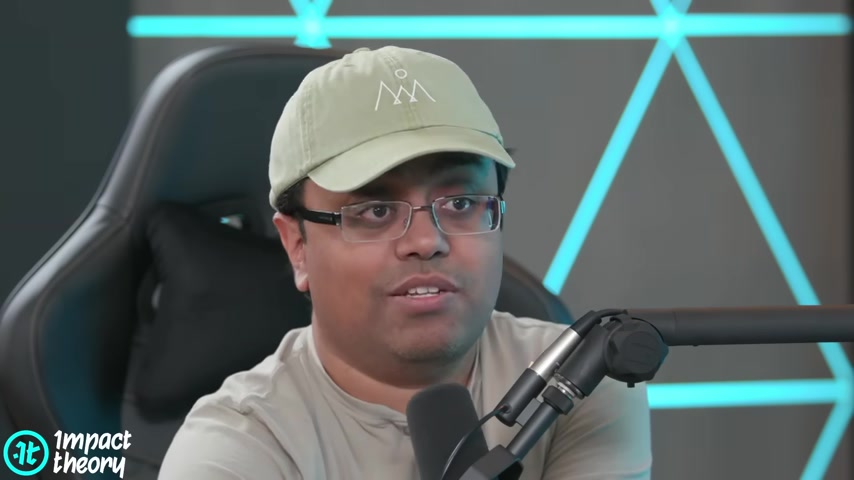
It's not intelligent yet .
It's still dangerous .
We don't know when this thing will become actually intelligent or self aware of .
It may never become , but we can see the probability of outcomes here .
It could be absolutely fine .
It could be very bad .
There are no standards .
So what you suggested it could work only if everyone does it .
We're never going to get everyone to do anything .
We never get anyone to do anything .
That's why one of the main things and proposals in alignment is let's build an A I first and tell the A I to stop any other A I from achieving sentence .
So what's known as a pivotal action ?
And that's the best of a lot of bad things .
My thing is let's build national data sets , let's represent the diversity of humanity .
Let's give the A I the right food .
So it's raised in the right way and it's more likely to be aligned as a result of that than training on the whole internet and crap .
Is it a panacea .
Is it perfect ?
No .
Do you know the story of Buddha ?

Which so uh whether this is historically accurate or not , probably irrelevant , Buddha , Siddartha Gautama .
If I remember correctly , uh Prince dad keeps him in the castle or the palace , whatever forever , never lets him see outside of it .
So he has no idea that there's people suffering .
Life inside is just amazing .
Then of course , one day he gets out and he encounters suffering and it ends up changing the entire course of his life punchline being you can try to hide suffering and things like that from people for only so long .
They are eventually going to find it and they are going to react .
And so if we try to hide the internet from the A I or train it out of them , they will eventually find the internet .
So I don't understand like the internet is just all humans acting in all the crazy weird ways that we act .
But then the reward function of the internet is not necessarily the reward function that we would like to teach our kids or try to teach a general purpose .

A I they can interact with that but they can learn how to adapt to it .
Just like if you raise your kids well and you show them the internet , they should be able to deal with it .
So we be rather than hiding the internet , wouldn't we be better ?
See , I'll finish the sense .
Wouldn't we be better giving the A I values .
The problem is this is all anthropomorphic .
We are assuming that they are human like you can give A I value .
So this is the reinforcement learning function .
Are you giving it values or are you giving it reward function ?
You , I'd say there's not much of a difference there .
I said you can embed things in the A I .
So it acts in certain ways you can expose it to the internet .
But again , they have something called , we have something called curriculum learning in A I whereby literally we teach it one thing and then we increment it with something else and something else and something else and something else .
How are we teaching these things ?
What are we teaching in , in what order do we start with all of the internet and then distill it down , that's how we're doing it right now or do we teach it a whole bunch of high quality stuff and then augment it from there .
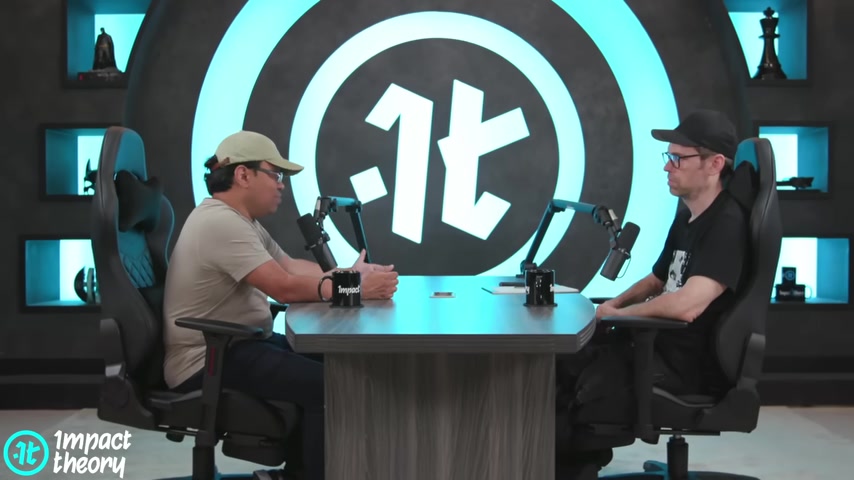
We already have evidence .
That's the tiny stories paper and the paper from Microsoft that you can have a far more efficient A I if you only teach it high quality things so you don't have to tell it .
Ignore that , ignore that .
Don't answer like that .
Don't say that .
Yeah , exactly .
You can just teach it a good base and then it goes from there and it scored higher on a human evaluation and other metrics .
But we don't know what the right data set is .
It's just right now we said , let's scale more data , more compute .
Now we're like , what's the right data ?
What's the right compute ?
Like our image model , we have over 100 and 20 different clusters of images only like nine are used like 95% of the time .
All the rest of the data is just Bunkum .
What does that look like for a language model ?
Like you need to train it on all of those auto generated transcripts of like spider-man pulling out someone's tooth on youtube and all these weird videos .
There's a whole subculture of generated videos where you have like Spiderman and Sponge bob square pants and Mickey mouse like having a fight and stuff like that .

I got to find these corners .
It's a dark area of youtube .
You don't want to go there , man .
Very interesting .
OK .
So this still feels like ultimately , what we're worried about here is the computer becoming sentient in fact or no , not even sentient .
I think there's a degree of dangers even before you get sentient but is a tool , right ?
Where a human is leveraging it to do bad things or like a group of humans coming together , there's suddenly a race condition where it just goes , it's not trying to do something bad .
The humans don't want to do something bad , but it happens just like the example I always give is youtube optimized for engagement , which then optimized for extreme content , which is optimized for I I , nobody youtube wanted isis to do well , all of a sudden it did because that's what the algorithm was optimized for .
And so once you start getting Agentic A I that you let loose on the internet and they can make decisions according to its reward function , you could get some weird stuff happening .

What's agentic agentic A I is A I that can go and pay a bill , it can go on the internet , it can search more stuff , it comes back like little agents .
Ok .
So , um and it learns , it constantly learns .
This is the other thing about robotics actually , you know , we kind of skipped over .
So your robots are getting massively capable .
Um And they're heading towards human levels just like self-driving cars .
Actually , they're pretty much here .
You can get a and a cruise and just go around San Francisco , right ?
Without any human drivers .
That what happens with kind of A I copyright and other things like that .
Do they have to close their eyes not to train or do they train on everything they see and does it disrupt blue collar work ?
So you'll get a billion , billion robots , we're not sure , but that'll be slower than what we have right now , which is information robots , the GP T fours and others of the world , those spread much faster because you don't actually have to build a fricking robot .
OK .

So before we depart from the alignment problem is the only convincing solution you've seen put forth create an A G I that stops all other A GIS from being created .
No , I think that'll probably kill us uh because it's a race .
I think the only thing that I have the default there , you think that it will kill us because it's being programmed to do a restrictive action .
So if you want to really stop it from creating another A R , you have to get rid of the humans that could create it as well .
You know , like again , this is a very negative reaction thing .
I think again , Elon's idea isn't bad programming curiosity , although it could lead to like Superman where you have uh what's his name ?
The guy who puts Candor in a jar , uh brainiac , you know , like let's put humans in a jar , let's just observe them .
Um The only thing that I can think of is just better data , makes better models .

So let me see if I understand Elon's idea , uh his way of sort of aligning it is the only impulse it has is for truth , truth and curiosity .
It wants to understand the universe .
So it's not trying to be an agent in the world .
It's simply trying to understand what is true .
Yeah .
And Demi that deep mind is very similar to this .
He wants to create A G I to understand the universe better .
And that seems like the model that's their model .
Yeah , like again , I'm not sure about that because there's just such a wide range of potential outcomes .
Like I said , from my side , I don't , I'm not building a G I , I'm not building gigantic models .
I have the capability to do that with the supercomputer that we have access to and the talent .
But my main focus is intelligence augmentation , smaller models that can run on the edge models to private data to transform into intelligence and models that bring together knowledge in certain ways .
So we can coordinate better .
I don't want to build generalized intelligence .
Why not ?

Because I don't think it's needed .
I think the models that we have today and there's something very important for this and it's like they are useful today .
Like you can say that we're like extrapolating the future massively .
But again , you just have to use them and think what if I had 1000 or a million of these things ?
They're so useful and they can transform the world right now .
So I'd rather focus on making this available to as many people as possible .
So people aren't left behind .
You have super A I enhanced people and super people behind .
Like I appreciate a lot of the work that open A I do because they don't actually do open source A I anymore .
But that's fine .
They don't have to , but they banned all Ukrainians and Ukrainian content from value to their image generation software for eight months for political reasons , they're entitled to do that .
But I think it's wrong .
And what if there wasn't an alternative , like stable diffusion , you'd have an entire nation erased from a model , an entire nation unable to create instantly .
And I think that's quite right .
Why did they , I don't understand .

They said it was due to political reasons because they didn't want any political content being created .
But the upshot is an entire nation was erased from the model and an entire nation couldn't get access to the model .
Interesting .
I haven't looked at that .
My instinct is that feels pretty flimsy since every country is going to put out political probably on some list somewhere .
And then the bureaucrat said , or the lawyers said something like , let's just exclude it just in case something happens , you know , like they've since reinstated it , I assume .
Yeah , it was like eight months that it was out .
And then again , like you have these examples whereby like Saudi Arabia , a lot of people on this call probably not on this podcast , listen to podcast , probably don't like them , but they're a country like any other .
You can't use chat GP T in Saudi Arabia because they're on some list somewhere , you can get around it with the VPN .
But again , like when you have a choke point on the internet and the only way to access it is through a few players , they can decide who gets it , who doesn't get it , what the biases are and other things and it might not turn out .

Well , actually , the funniest thing was , um , there was a period where they were trying to make dally to the image generation software open A I am biased .
So it would randomly allocate a gender and a race to non gendered words .
So you type in a wrestler and you'd get Indian female Sumo wrestler .
I just thought it was funny , but again , they're doing their best because that's the model which is centralized controlled models in order to advance a whole bunch of things .
And then you'll always have an Windows and Linux and Android and iphone .
What's the philosophy that drives your development ?
Uh It's building blocks for humanities , activate humanity potential .
So if I build these models and I take them to other countries and I hand them over , then people will build stuff that can create massive economic surplus , new jobs and it equalizes the world .
Again , my view is the global South will leap ahead .
Um We have more challenges here in the West , but I do see it as a great equalizing function effectively .

What do you want to see the regulatory framework here in the West ?
Be I think that things like the Chips Act in the US , there's $10 billion allocated to regional centers of Excellence and I should be 100% of A I , there should be regulatory sandboxes so that our systems can be upgraded with this because otherwise , how long will it take the government to be up created with this technology or financial services and others ?
Um And I think that there should be regulation around the manipulative use of this A I for advertising in particular because we're not gonna understand what's happening .
Similarly , we need to have some sort of provenance factor .
So we're part of um kind of various certification things we're exploring Blockchain and other things , the media wave that's gonna come is gonna be insane .
And we don't know what's true and what's not .
What do you think about the pushback from artists in certainly in the art community there was a really big , no A I movement .
Do you think , do you get it ?
Do you think that they're , um , shooting themselves in the foot ?
How do I get it ?

You know , these things are fearful .
A lot of illustrators were very scared because they were required to up their jobs .
And it is scary .
There's a question around attribution and other things as well .
And again , that's why we made it transparent and offered the chance to opt out because like everyone was kind of doing this , but no one was transparent about it .
We don't need to have any crawls with an ear .
It will be synthetic data sets or national data sets or similar with retrieval augmented models that can look stuff up , but it is what it is now .
And again , you got to put the word out there , the actions they're taking with the various lawsuits and policy pushes would basically entrench all power with the existing IP holders .
And a lot of kind of artists are pushing for something that would be akin to music , copyright or even style is copyrighted .
That's a dark road that I don't think they really want to go down and they don't really understand it .

But again , I understand the fear because this is completely unknown just like now uh from some of my previous comments , it got a lot of program I hate because what is a programmer , the nature of what an illustrator is , will change all the artists I know love this technology because it's just not the medium for them .
The nature of what a programmer is gonna change all the architects and 10 times people I know really love this technology and this is what we've seen with like mit studies and other things .
They had a study where I think they showed that the third to the seventh percentile got like 2030 40% better and the top 5% got multitudes better because again , how many people know how to deal with very talented youngsters .
Very few those that can harness it get even better .
So when you look at what NVIDIA is doing , what do you think that that implies for the next generation of A I Well , I mean , it's we figured out how to scale these chips .
So the previous limit was as you put more and more of these supercomputers together , you had a tailing off as you scaled .

So there's only so much that you could scale the compute nvidia Google and Intel have basically cracked that now in terms of how to just stack more supercomputer chips to scale to even bigger models or models that are trained for longer .
So it's either bigger or trend for longer , trend for longer seems to be better now .
And that just means that the capabilities will increase year by year and they're already pretty darn good .
The key bottleneck will probably just be actually chips to run these models , not chips to train these models , the inference side because right now you have a small amount of consumer interest next year , it becomes insane .
You have a small amount of enterprise interest next year .
It becomes insane and there's not enough GP US or chips in the world to meet up with that demand .
OK .
When I think about what's going on with , um I don't know if it's just NVIDIA , it's probably the wrong thing to attribute it to .

But when I think about how we're getting so good at creating things that are photorealistic you were talking earlier about as the election is coming up , you're going to get all this kind of deep fakery .
You've talked about the web three promise of web three and sort of where it's ended up .
Um What do you think the role is for deep fakes ?
It's the Blockchain player role .
Like how do we stop disinformation , misinformation from being a tsunami that just makes global communication unintelligible .
And we're part of content a authenticity dot org , which is kind of verifiable metadata .
But we're looking at Blockchain and other solutions and I can get you so far .
So we actually have invisible water marking and all the models that we create .

And that's why we're pushing for them to be standard , which we don't share the details of except for to the big platforms and others and it would be permanently visible there or the platforms that it plays on would have to flag it , it's visible and then they can have kind of tools around it because we think that's important .
That's why we try to build the defaults into our model .
Can you like download that and wipe the watermark ?
If you even have A I wipe the watermark for you .
If you knew how it was , there may be more than one water mark .
So we have a variety of different technologies that we've incorporated into our own ones because again , we really open source .
So we want good defaults .
I think you do need to have some sort of attribution .
But actually what concerns me , I think things will be attributable , identifiable .
What worries me is kind of frequency bias whereby if you hear the same thing over and over , over and over again , especially in a realistic voice , like Oprah comes out and says she hates Joe Biden , you know .
And so does Kamala Harris .
And your aunt is seeing these videos all the time and they can flag it as fake .
It doesn't matter .

It still forms association in your brain .
I do about that .
I'm not sure .
I don't think we haven't answered that .
Like , um , I've had a big amount of press against me saying that I exaggerate a lot .
I'm just like , I'm just really definitive about the future and you can correct it all you want .
But now I was like , Emma exaggerates all the time .
What can you do about that ?
You can just make the future true and show what you can do , right .
What part do they think you exaggerate about what's possible or what's possible and kind of what was there ?
Because it's been a bit weird , like a lot of people , like , you didn't have a special relationship with Amazon before we raised any funding .
We built the eighth fastest supercomputer in the world with them that was dedicated to us .
You know , like that's factually true .
They're like , yeah , but you know , there's nothing like in print and they're not saying that because it's a special deal , right ?
And then there's the future side where I say something like there will be no programmers as we know them in five years .
And they're like , oh , he doesn't know anything about programming , right ?

Because these are complicated issues and it's a crazy time and a crazy company and maybe I'm a bit crazy too in terms of the way that I approach this , which is just being very definitive .
But again , it's an association thing , right ?
Like how do I shake that off ?
Well , you be successful and you become a visionary rather than someone who's hyperbolic , right ?
How do you affect an election ?
What are elections ?
What is representative democracy ?
How does democracy act in in the area of zero cost creation and massive optimization .
So every single speech will be run through G BT four cadences , all this everything you get micro targeting , you get all these things .
Does it happen next year ?
Probably not next year .
You see some very basic stuff .
Well , what does 2028 look like ?
I am not sure genuinely .
And so we do need authentication standards .
We do need to have some sort of maybe antivirus A I that watches out for kind of fake stuff but even true stuff can cause huge impact .

Like the Silicon Valley Bank collapse was a true story .
It wasn't something fake , they didn't have reserves and most of our system is actually based on trust .
So these are some things that concern me .
I don't have the answers .
But again , that's why you have to kind of raise the alarm light .
Let's try and figure this out before it comes because maybe it doesn't happen next election .
It sure as heck will in the congressional and then beyond and again , what is the nature of democracy when you can't tell what's true or not ?
People worried about this with the previous kind of era .
This is something just beyond that I think because it's convincing .
Yeah , that's one of the things that I think is gonna be a very meaningful problem .
Um I had Yoshi Benj on the show and he had also signed a letter saying we should pause for six months .
And when I asked him why he said , considered by many to be the godfather of A I and I was like , bro , you've been at this for so long , like why all of a sudden ?

And he said they're uh we were all so taken completely by surprise with how quickly A I passed the touring test now for people that don't know what the turing test is .
It's where you're having a conversation with an A I and you can't tell that they're not a real person .
And he said so , yeah , we did not expect it to pass the touring test as quickly as it did .
And that changes everything and it's just moving so much faster .
And that's really the thing I want people to understand is that when a guy that spent the last 30 years building A I says , hey , all of a sudden this is moving a lot faster than we thought it would .
He's somebody that's very familiar with exponential curves and even trying to plot out the exponential curves , they didn't think that it was going to happen this fast and that the , the rate not only is the rate of change extremely fast , but the there's the law of accelerating returns .
So the rate of change is already fast and it's getting faster .

And that's the thing that I'm really worried about is is this gonna be something that just blindsides us from that perspective ?
It's just it has there's a level of capability that we we didn't expect this quick .
Yeah , I think it's a bunch of S curves all at once .
So there's three of them , Lu .
Jeffrey Hinton and Joshua Mano and Jeffrey Hinton quit Google to say this is a massive risk you have .
Jan Lu is like this is a massive opportunity in terms of you transform the world .
He loves the research and things .
So they've got one versus two .
But the reality is every expert in this area is basically saying none of us can predict what's gonna happen .
If you ask me about the capabilities of this technology in one year .
I got a rough idea .
Two years , I have no idea .
All bets are off like as a practical example , when can we have generated Hollywood quality movies ?
It's not even a question of if now it's a question of when I have , if it happened a year from now , I'd be like , ok , sure .

I would not even be surprised anymore .
I think it'll be a few years from now .
And even though we have one of the best media teams in the world that are building video models , I have no idea because there's two parts of this , one is the models themselves .
But the second part is how we use the models and combine them .
Like there is an amazing company called Wonder Dynamics .
I don't know if you've come across that .
I've used them .
It's awesome , unbelievable .
And it's a bunch of different models .
So Wonder Dynamics , you've got me click on it and then say , I want him to be an alien and it does this and the aliens waving its sounds and it takes like five minutes .
It would have taken days , weeks before weeks , weeks before to create a character is one of the most difficult things you're going to do in 3d .
It's insane minutes .
And then you think , well , what is a movie ?
Right ?

And you start breaking down and you're like , oh dear , because it's not necessarily just one model , it's a model combined with other models with the right flow because you have one talented youngster combined with other talented youngsters in the right flow suddenly gets these things done .
And that's what makes it even harder because what we're talking about is models and A I , what we should really be talking about is systems as the models come together and build better systems , the capabilities go crazy .
And then that is another S curve connection .
Give me what you mean by systems .
So right now again , a lot of the interactions we have with these say the text to image the avatar creation , the GP T four are 121 .
What happens when you start chaining them together to check each other's outputs .
You have one that just learns everything about Tom .

You know , you have your own A I models that you train on all of the stuff that you've ever done or all the stuff that you see on your computer screen , that's a system of lots of A s that's an organization of A S , that's an ensemble of A is like again from the leaks GP T four is a mixture of experts model , which means they have a whole bunch of different models , I think eight or something or 12 that are experts in different areas .
And then it routes the query to whatever the best specialist specialization versus gene A generalist .
So we created a know it all and now we're creating specialists , but we can get generalists to even check each other's answers to get better answers .
Why you use one when you have a dozen .
So something like one of dynamics uses a bunch of different models to rig a character and figure out all of the movements of the character and then another model to do a layer over another models to do the skinning and other things like that because they built great software .

Yeah , this is uh this is really crazy how fast this stuff moves .
OK .
So I want to talk about um web three , web three to me .
Uh When I think about what drew me to it in the beginning , it was entirely the technology and when I look at the Blockchain , so I obviously come at everything from the lens of entertainment .
So I'm thinking about digital worlds games , all that .
And the problem is once it's digital , then it's all sort of meaningless .
And so you end up having to trap people inside of an ecosystem in order for things to retain their value because you can lock things in and make sure that things only react the way that you want , but you have to confine them .
And when I had first , this is probably seven or eight years ago .
Now , I was introduced to this thing that the guy at the time called V Adams .
And I was like , oh wow , that's gonna change everything because what it does is it brings the effectively the laws of physics into the digital realm .
It means that I can uh have something I know exactly how many there are .

I know where it is .
I know what you have to do to get it .
I know what it does once you have it and , um , then , you know , flash forward , whatever .
It was probably four or five years after I heard that I hear the letters NFTS throwing together for the first time .
And I'm like , oh my God , this thing actually got real because I wasn't ready to use it .
And quite frankly , it wasn't ready for prime time back then .
Um , you , I think , look at Web Three , I don't know , as a movement or as a technology with a bit of a chuckle .
What do you think that Web Three got wrong ?
I think it lacked intelligence for a start at the contract level .
I think the smart contracts are actually just logical contracts , but like Web two was A I at the core Google Facebook , other things , there was no A I in Web three and so Web three for me was identity and value transfer rails .
Um But then there was no kind of intelligent routing of these things and also they tried to bootstrap economic incentives before they created value .

So there was a system created outside the existing system , all the money was made and lost at the interface .
And there were some really good principles .
A lot of really good people in there .
But then a lot of like fricking raccoons that were just trying to make a quick buck , right .
The ups and downs of the cycle means that a lot of people have been washed out and there were a lot of good ideas there .
But again , it needs something to bring it together because to get information from one place to another .
And Bitcoin paper was about information , it was a transfer of value that's just a transfer on the ledger , right ?
Not really a transfer , it's just a ledger point .
Just changing applying intelligence to that makes that even better .
Having intelligent market makers having a is that represent you because how are a , is when they get agentic , when they have the ability to go out into the world , not physically , but digitally , how are they going to pay each other ?
They're not gonna have bank accounts , right ?
They'll probably use crypto , you know how there's going to be a system of record for something like image generation , you'll probably use a Blockchain or something , maybe a merle tree series .

You know , there was a whole bunch of stuff around Federated learning and zero knowledge proofs and things like that .
A I can help it .
If you have standardized A I on your phone , they can make much more intelligent there , large proofs and Z for something like , you know , like rather than showing a whole passport , you just say that I'm old enough to drink and it can verifiably show that .
So I think that there was a lot of promise , a lot of really intelligent stuff , a lot of good stuff around the distributed side .
But then an over focus on decentralization for the sake of decentralization with massive overheads .
A lot of quick buck people kind of coming in and trying to boost it up and a lot of systems were just misaligned because they didn't learn .
Like you don't do a fully decentralized flat democracy .
You have a representative democracy and things like that .
So things like dow just turned out to be decentralized organizations rather than autonomous .

So , is it something that you think um that is going to find its way into usefulness now as we get the , take an A I agent that's going to need to be able to ?
Yeah , exactly .
Does , does it step into that or because I see what we're building , I have to have the Blockchain .
So for me , it felt like when I was sort of living through web three at the height , I looked crazy to everybody because I was like , why is everybody thinking about this ?
From a financial perspective , the financial side of this I thought was going to create hyper perverse incentives , which of course it does .
Um And so for me , it was , well , wait a second , just look at the technology , look at what the technology allows you to do .
And are you familiar with the new ?
I forget the , whatever the , the lead up code is , but it's um protocol 6551 , if I'm not mistaken , it's really interesting .

It basically turns any uh digital asset into a Russian nesting doll .
And so you can , it it is both the piece of content and a wallet in the same time .
So you can create an A I character .
This is how I think about it .
So what we want to build inside of our game is uh imagine an A I character .
We , we do in fact have a character and she's a merchant .
So now imagine this merchant can actually go negotiate with the players in the game that may want to sell something inside of the game .
And if she has actual currency , Bitcoin , whatever , she can go and negotiate with real money and have these real interactions with people .
And then if she has a limited amount , she becomes an economy unto herself .
And so she's buying and selling and trading until she runs out of goods , runs out of money , whatever .
Um and that kind of thing gets very , very interesting to me .

But without that layer , uh one , obviously , I need the entire backbone of the Blockchain in order to make the digital goods have uh any sort of value because otherwise they're just completely infinite .
But then also that particular protocol allows you to as you , you're effectively embodying it and giving them agency as you were talking about .
Yeah .
And you know , the question is , do we use a Blockchain for that ?
And then have a global system of record or even a regional system of record or do you use a database for that ?
Right ?
Like the whole thing was systems of record and in an era where you can create anything for increasingly close to zero , something becomes important .
Having a system of record becomes important .
Is it gonna be a Blockchain ?
Is it going to be a trusted database ?
I'm not sure .
Right .
Is identity gonna be important here ?
100% .
Absolutely .
And again that for me was always at the core of web three crypto , it was verifiable .
Identity .

Bitcoin is just identity to identity transfer of value .
And what happens if something goes wrong ?
You know , no , no man need it .
So I think a lot of the principles from Web three will translate over to this new type of A I , especially because it enables distribution of knowledge , it enables knowledge to go to the edge , it enables agents to operate independent of massive infrastructure .
Do you ?
So and again , this may just be naivete on my part .
But when I imagine uh misinformation , disinformation , it feels like the only way around that is the Blockchain is there .
Do you see a way with a trusted database or anything else ?
A trusted database ?
Again , what part of the trusted database be ?
And how could it ever be something that's beyond reproach when you're talking about something like um well , I mean , like things are never beyond reproach even with the Blockchain because it comes down to identity , who wrote this to the Blockchain , right ?

So if you can coop the signing authority of an asset of an image or something like that , then that shifts things dramatically , right ?
You're saying it just pushes the hack to a more individualistic level .
It's an identity hack , right ?
So , and again , like one of the things I'm like , you can track the provenance of an image , but then sometimes it's just around , if you're just bombarded by fake stuff all the time , you won't even know it's fake and all the systems have to adopt a fake detector at the same time .
Or provenance detector .
Will we be able to adopt that suit quickly enough ?
Given the tsunami that may or may not be coming our way , I think probably , yes , it may be .
No , I mean , again , people were worried about deep fakes back when deep face lab kind of kicked off , but I'm thinking probably yes .
Yeah , that , that one seems inevitable to me .

Um It , you're always going to remain vulnerable at some point , but at least like take political messages you were talking earlier that , you know , your auntie is going to be bombarded with all these messages .
Ok .
There may not be anything that I can do actually .
No .
Uh I was gonna say there may not be anything I can do about the repetition .
But I can , if I'm doing something like ad MC A strike where the system itself is built on top of uh a system that checks for sort of known watermarks , like if I register and say , hey , I'm Candidate A and this is my Blockchain signature and if you don't see that , then this is real and this isn't real and don't play it .
Um It definitely starts to get into an area of how much do we want to be clamping down exactly how much do we want to trust .

And so it's just a lot of infrastructure that has to be implemented really quickly , a lot of standards that have to be implemented really quickly or we have to build some sort of idea antivirus , which then again , how do you work any time that anything comes that the machine thinks itself on the edge is wrong or doesn't reflect your values ?
It identifies it and that's a whole cat of worms by itself because something like terrifying .
Would we ever want to , I mean , that's like echo chamber on steroids .
It is , will it happen ?
Oh yeah , there's , there's layers to this like an onion and it might get stinky if it's left out in the sun because again , what's Siri gonna have as her personality ?
But are you gonna have a red version of Siri and a blue version of Siri ?
And o this gets really complicated really quickly before we have the little A Ifg Jesus Christ .
Ok .
So I keep wanting to go to the positive but you keep bringing things up that spark um concern .

So uh Ray Dalio , largest hedge fund manager in the world is a former hedge fund guy , I imagine , you know , exactly who that is .
Uh , at last check and this was several months ago , but at last check he said that he saw , uh , he believed that the US had a 40% chance of civil war .
Do you think that A I increases or decreases in the short term , the likelihood of that level of division in terms of physical altercations ?
Yeah , I don't think that'll be physical altercations really .
No .
Tell me why not .
Um , well , I think the government will exert more and more control over kind of these things and they'll actually figure out how to do counter narratives within the next four or five years .
Now .
That can also mean a controlling narrative and that's not a positive thing .
But then you look at the asymmetry of kind of warfare .
It takes quite a lot to actually push someone towards civil war unless you have massive economic disruption .
They need about 12% of the population to shift .
Weren't we just talking about massive massive economic disruption ?

Yeah , I hope it doesn't happen there .
Ok .
So , and most people again , maybe if you have massive economic disruption , but then the youths , you just give them old girlfriends A I girlfriends , maybe he'll be fine .
Have you heard that ?
So this is a big thing in the Red Pill community .
I don't know how familiar you are with all that .
Uh But they talk about , oh God what do they call them ?
Not numbing .
Uh , but that's the idea .
They use a different word for it , which I'm totally blanking on right now .
Um , but basically that you numb people out , you give them the digital girlfriend , you give them pornography , you give them video games , you give them masturbation and they just , they numb out .
Ok .
I can see that .
I mean , again , like these are insane shifts in society and do magic edges in the brain .
People are attacking the limbic system all the time now , right ?
That's a lot .
Um And so like I said with me , why I set up stability is so that everyone can own their own models and have models that have objective functions for them .

And it's available in all the media types , all the other types to transform the private data of the world and it's available across the world .
Put good design patterns in place , hope people find follow them , don't try and push the envelope on A G I and some of these other things , but it's coming .
And again , the bad guys have the technology because they just downloaded it on a USB stick .
Um And so the only thing I could think was innovation , spread diversity , bring that to the fore .
But realistically like , you know , I tend to alternate between like massive ridiculous hope and oh God , what's on earth is gonna happen ?
And all I can do is try and do my bit and hopefully it's going to have a better outcome because there's real , see , this is the other thing , the total number of people that are actually thinking about the type of stuff we are talking about is a handful , maybe a few 100 .

The total number of people that are doing something about it is literally a handful because most of the people involved in this sector , they just want to build a better A I , they want to build A I that can do everything .
And they think that that will solve all the problems .
Like literally part of the manifesto is that , well , how do you make money ?
The A I will tell us how to make money .
How do you solve the problems ?
The A I can solve alignment .
Does that strike you as patently ridiculous ?
Yes .
But again , like I look at these things like literally on open A is thing road to A G I , it says this could kill us all .
We're gonna build it anyway .
Who did they ask about that ?
I don't know .
And again , I think it's full of wonderful people , but we're in really weird times .
And again , like how many people listen to this ?
The reality is the technology is right there even if we stop today .
So as the technology doesn't move beyond where we go today , the world has changed .

OK , let me um one I think very reasonable way to view this situation is that um A I is going to be a bigger paradigm shift than nuclear energy and there are people out there making these gigantic nuclear weapons .
And you're also in this game and what you're trying to do is make sure that everybody has a nuclear weapon so that nobody is left behind .
No , not really .
I think that again , my thing is an A G I , it's intelligence or I'm making sure everyone has A , at the very least because you , well , so OK .
So are you putting guard rails on what you guys are doing to stop it from becoming a G I ?
We don't build big enough models for A G I or emerging on purpose .
So I held back release of my image models like we could train much bigger language models but we choose not to .
So we're a , we're a fast follower on language models .

We try not to push the boundaries and we're focusing on the edge , not general purpose models but models that can transform your private data .
So a different focus image models as well .
We could , we could have much better image models .
If we are big , we're focusing on what can work on a smartphone .
So we can give it to all the kids in Africa and Asia and other things like that where we can transform your private data at a very low cost of influence .
So the objective function is augmentation versus generalization and that's different to most of the other people that are pushing the boundaries here .
Um So , but I think the new thing is it's good as bad .
I want to really want to see that movie .
Oppenheimer .
I think it just came out , um , Bobby and then Oppenheimer Oppenheimer , then Bobby have to decide that the tough call .
But , you know , like what if we put nukes on the bottom of the rockets ?
We'll probably be at Mars by now .
General purpose technology , I think is quite something .
And again , it can warm up entire places and it's the cleanest energy we have .
So I think it is dual purpose but so is cryptography , right ?

Think about all the battles that are in the early stage of the internet .
The bad guys are gonna use cryptography .
So don't use it , imagine a world if there was no cryptography right now .
But it's tough to get parallels to this because it's just such , it's an immediate technology because again , you go to Dream Studios , Table Diffusion mid journey , any of the GP T four , you can just use it .
It's not just you that can use it .
It's your grandma that can use it .
We've never seen as easy to use technology as this and as easy to implement technology .
So if you want to create an integration into open A is GP T four chat GP T , you just write a description of the integration and it programs it itself , it would have taken days before we've not seen a technology like this that can be implemented to an existing base as quickly as this can happen .
And that fundamentally changes the structure of society .
And so my thing was embed guard rails , embed standards , make it predictable , make it boring .

That's why I called it stability and it's not easy .
Um But again , I want to have the transparency on how these things are done because then you've got all these other models that you don't know what the data is , you don't know , they're completely opaque , these giant models and ours are transparent .
And again , I think it's a Linux Windows Android I OS there will be both , but at least I can do what I can do and my team can do what we can do .
I've heard you say that one of the reasons that you named the company Stability .
Uh not just because it's the boring stalwart but that you thought that it could bring stability to the global order .
Yeah , I think if you give the same education tablets to every child in the world that's constantly learning , adapting and going around .
If you upgrade the health care systems with the same underlying models , the same architecture to transform all the regulated industries , governments and other things .

And you give back the control of that to the people , you suddenly have a unified architecture that can enable us to coordinate better because you've got the same information architecture across the world for all of these sectors .
And that's a complex hierarchical system .
Herb Simon was a theorist to kind of push this through in that the way we coordinate as humans and groups is we coordinate at a local level .
And then sometimes we can tell better stories that we suddenly get to the human colossus and we got a COVID vaccine or we figure out nuclear power or all these kind of things .
So I was like , if I can standardize the building blocks on which society transforms and give it to the world , then I don't think there's a single problem we can't solve .
Like , you know , you got excited earlier about your own personal kind of A I that can go into that .

What if you combine that with an A I that knows everything about climate or everything about , you know , um nuclear power or everything about multiple sclerosis , you break down the barriers for information , for knowledge and you there's no problem you can't solve because it may be that to solve the problem of A I impacting our society .
We need A I to figure out that problem to bring together the brightest minds because we're not doing a very good job ourselves .
Like you mentioned John Nash earlier , Nash equilibria game theory and mechanism design .
On the one hand is our own personal A is guiding us our copilots for life .
But then there's pilots which are A I that can coordinate all the copilots and that can allow us to tell bigger stories and unify better to achieve massive outcomes .
Talk to me about you , you've mentioned story like that several times .
What do you mean by story , better stories , unifying stories .
What does that mean ?

So this is the story of America and what is the story of America ?
It was kind of like freedom , liberty , kind of all these things .
It was the American dream like a progress thing that people believe in .
Because to be happy , you need to do something you're good at something you like and where you believe you're measurably adding value .
And the other party does as well in the middle of that , that's the Japanese concentrate .
A guy is happiness .
One of the concerns that you have is that people won't feel the forward motion anymore , they'll be stuck and they'll feel a sense of emptiness .
Will they turn to religion ?
Will they turn to political parties ?
Something will fill that gap and void .
And those are the stories that allow us to scale as a society .
Because when we started , we were oral , we had our families , we had our tribes and then we formed countries , we formed organizations and so we are the stories that make us up .
We identify as a Republican , we identify as a Barbie lover .
You know , we identify , you know , as a nuclear scientist or the schools that we went to .

But it's difficult especially in a time of polarization to try and bridge those stories because ultimately , there's a single story which is we're all human , but all wars are based on the lie that we're not all human because killing each other is a ridiculous violation of the story that we're human .
But again , we lose sight of that .
It's difficult to unify people .
Actually , one of the examples I give this is Google .
Everyone is smart , people will hire smart people .
They did a study to see what identified smart top performing teams who low performing teams .
It was called Aristotle .
And they came down to two things , a unified mission and story , especially one that's like you have a crunch period and then you all band together just like marines also are forced through hazing et cetera and then psychological safety , the ability to say something without fear of approach .
Like they can say the idea is stupid but not that you're stupid .

And if you think about the teams , you've had , they have a shared story , a shared narrative , a cohesion and then that level of psychological safety or if it's not creative , they blooming , well , listen to instructions , right ?
So you've got a few different ones around that .
So that's what I mean by stories and the stories are context and the context is what these models capture .
All right , let me paint a um troubling scenario for you .
Based on that idea of these stories , there are often times things that in isolation are amazing , but they come together in a way that again , maybe in the long arc actually are amazing and actually do yield what we want them to yield .
But they , we will go through a period where the long arc of history cares not for the individual .
So um I think that what's going on with a I what's going on with crypto may be one of those moments .

So as the individual becomes more sovereign and you have a monetary system that bypasses the government when I first started learning about what money really was .
And I sat across from Robert Breedlove and he started describing um why he liked Bitcoin , what the whole idea of the sovereign individual was .
I realize , you understand that you're making the government an enemy or certainly a they are no longer powerful , certainly no longer as powerful and that , that they're not gonna go quietly , they're not just gonna let go of that .
And so if I have an A I , if I have a team of a isa 1000 A is that are able to guide me far better than any government could ever hope to guide me that they're giving me real time data based on whatever whatever it is that I'm trying to figure out in that moment , they're giving me real time data , extreme intelligence .
Oh And by the way , the currency that I use is Bitcoin .

And so I'm not even tied to a fiat currency .
It's a global standard .
Um Do you not see the inevitability of the disintegration of governments ?
No , I think that Bitcoin and other things , they have a value in certain areas .
But I think it's very difficult for most people to understand that value and most people don't want that value .
Most people are quite happy in their communities and they just want to get on with life .
I think that governments are ultimately one definition is the entity with a monopoly on political violence and money itself is a story like the dollar is just an intermediation point that we all commonly agree has value because it's backed by taxes which are backed by the army and military might .
You don't pay your taxes , you're gonna get in trouble , right ?
I think it's difficult for Bitcoin to replace that unless you see a massive deterioration in the ability of the government to be the political violence thing .
This comes down to your thing of civil war .

It comes down to massive ridiculous disruption , hyperinflation or otherwise that just basically takes down a society .
I think that's a very dangerous thing .
I think most people in the world don't want that .
Instead , what happens is when you have disruptions .
You have .
Um Hayek had a really great book , The Road To serfdom .
And there's an illustrated version of that way back in the 19 forties about bringing in the strong man , like you look at something like the US election or you look at Brexit , what were they ?
They were a referenda .
That's how the parties deconstructed it .
Are you happy with the way things are ?
No , let's make a change .
And so that's why I think Trump and others kind of get elected and I think that's what we'll see as well because the systems are quite resilient and the nature of a change to go to a global monetary system like that , especially when some people will get enriched more than any others because of the senior age of Bitcoin and it's not stable .

I I have to struggle seeing that happening if you read the book in film , Ocracy .
No .
Right .
So this is all tied to the thing that I think I worry most about is hyper fragmentation was talking about it earlier .
So in the book info , um to your point about people are happy in their communities .
And uh log has an idea around this , that he calls the network state that basically we're going to reach a point where um when money is no longer controlled by the government , when your money cannot be inflated away when it's it's true , sound money .
Uh What you'll see is people will begin to aggregate .
Now , blog thinks that it , it is not going to be tied to geography .
I have a bit of a harder time with that .
I think that there is still going to be a geography component that's where info comes in .
And that book basically they're in , in a high connected digital world where , and I can't remember if they deal with digital currency or not .

Let's say that they do that basically things will fragment down into the neighborhood .
And so neighborhoods become like states or countries where they have their own rules and laws .
And that sounded like a hellscape to me because you just passing from one neighborhood to the next , like different rules would apply and your phone would ding and it would update you on like this is what you can do in this space .
You think that's uh complicated .
People don't want complicated , they just want to get on with life , they want to see what's next on TV .
You know , I think that again , we're relatively hyper intellectual , you know , and we think about things , a lot of people don't um because people have their basic needs in life and this question of are these being met or not ?
And if they're not being met , then you have action and you get extreme .
And again , it's , can the society meet the needs of the majority of people ?
Can it offer advancement ?
Can it offer meaning ?
And the high fragmentation , you said it sounds like a HECA it's just too complicated .
And again , this is something we saw went through as well .

People just overcomplicated things .
Yeah , because they didn't really understand people maybe .
Um And I think , you know , it's gonna be interesting to see how it evolves , the hyper personalization versus the bigger stories , the translations versus otherwise .
Um But I find it again difficult to see how you get cross geography .
If you think about that , one of the things that probably is going to be interesting is what are the new cults , religions and political movements of the next 5 to 10 years that are hyper organized , utilizing A I and hyper persuasive or started by A I started by A I , you know , like , think , look at I I , they were probably the most disruptive startup in the world at one point , they borrowed a lot of these things .
What does an A I enhanced movement look like ?

And it can be negative , it can be positive , someone's going to take this and run with it and that's gonna organize people around the world and it's gonna be again , echoing and it could be techno utopian , it could be Luddite , ironically , even with this um political parties will change , religions will change , cults will change .
Um And it really amplifies the power of the controller of this who tells the story .
And I'm not sure I haven't really thought about that and I'm thinking about it now because you're talking about hyper personalization where I think this is the flip side of it .
I mean , this is Isaiah Berlin's conceptualization of positive and negative liberty .
So positive liberty is the freedom to believe in ISMs .
Fascism , communism , Islam is all kind of whatever , right ?
Whereas negative liberty is the freedom of being told what to do .
And so his thing was like positive ones are bad because they form these massive movements and then they tend to kill people because you have the Gerard thing of Metic theory where you want what other people want it .

And then there's a scapegoat whereas negative liberty is the freedom of being told what to do .
And that led to Laissez Faire capitalism and this consumerism that we saw around the world .
And so maybe as people lose meaning , they'll turn back to religion , there'll be new religions , there'll be new political movements and we're not sure what those will be , but they could spread faster than anything we've ever seen .
And so that's probably something to watch out for within that five year period that you're talking about .
And I think that relates to this network , state concept and other things .
But for the people that get engaged by this , and again , we see that's largely the youth .
So on the one hand , you have the youth with the A I girlfriends .
On the other hand , you have the youths that want to believe in something bigger to fill the void and who's gonna step in .
Yeah .
And I think that there , there is something about not having a shared narrative that really makes me nervous .

So uh you all know , a Harari talks a lot about Hey , the thing that makes humans so intriguing is that we're not only able to organize these really large numbers , but unlike ants that have to do it in a very strict way , we can do it in a very flexible way .
But we do it through the shared narratives .
Now for a long time , religion served as the , the thing that gave people a shared narrative .
But as religion breaks apart and we get into this hyper personalization and it all begins to fragment , then you mix that with this idea that I heard from Jordan Peterson .
I'm almost certainly heard it from somebody else .
But uh this idea that everybody has to go through a Messianic phase where they want to really contribute to the world , they want to feel like they matter and they begin glomming onto all manner of things that seem good in the abstract like climate change .

But when you are glomming onto climate change is your way to save the world , you begin to get into the realm of , well , it's OK if we have to break some eggs to make the omelet to this .
Yeah .
Yeah .
And it rapidly devolves into me .
So how do we , when you , I don't , you said you haven't really thought about this , but I'm super curious , at least in real time , how you think about the idea , how do we do we need to give people a unifying narrative ?
And if so how do we go about it .
We need to tell better , more positive stories about the future .
And these are the stories of universal education , universal health care , you know , solving the mysteries of the universe and others .
So I've got a lot of because that's hope for humanity , right ?
And a lot of the things that we see are dystopia because you're looking at the tiger , you're spotting A I is the tiger in the bush and it's difficult to write a tiger .
But maybe that's a kind of cool picture that we can make in stable diffusion in two seconds , right ?
Because it does have this duality of potential outcomes and maybe it's actually all of them .

So what are the stories that we should tell ?
And I think this is again part of the crisis of what is the American identity ?
What is the American story today whereby you've gone through many cycles ?
What do Americans believe and what does America want it to be ?
I'm not sure what Americans want America to be .
You know , I'm not sure what Chinese people want China to be .
I'm not sure what people want .
And I think that it's difficult to think about what is your objective function .
How are you going to measure your life and other things ?
Religion filled a lot of those kind of things , but it still does .
Religion hasn't gone away .
Half the world is religious , right ?
More probably like you actually look at the numbers .
Sure it decreases in certain areas , particularly somewhere like America .
But it's going strong around the rest of the world and it's just growing because they have more kids than non religious people .
Maybe that fills the gap .
But how will the religion transform with this technology ?
I mean , let me ask , do you think that the countries with the religion will be the ones that propagate into the future ?
Because they have a better shared story ?

Well , no , because they propagate literally , they procreate .
That's how the story ends up pushing them forward .
I think it could be .
But then you know , what is the nature of Christianity with A I or Islam with A I Islam is actually the one that's most affected by A I .
So Christianity , you and Shia Islam , you've got like Popes , you've got Protestantism , you've got this , every single one has their own structure .
Sunni Islam is based on interpretation of texts where the interpretation having ceased around about the 16th century because the text became too complex .
What happens when you apply A I to that ?
And the texts are interpretable by anyone with all the context and nuance and there's no centralized authority in Sunni Islam , which is like a billion people .
That's going to be very interesting .
What does that do to Protestantism ?
You know , where you don't have necessarily a pope ?
What does religion look like when all of a sudden you have a branch that is A I enhanced to interpret texts and to tell stories that are resonant and better .

Oh , gosh , there's a lot to think about there .
Right ?
Does a I become a God ?
Well , some people are trying to build an A I God that is a G I , you look at the statements of people trying to build a G I , they're trying to build God because it will bring us utopia or kill us all .
This sounds very , again , classical , right ?
And they have fervor , they genuinely believe that they are going to save the world or destroy it .
Yeah , we got back to the dark stuff , didn't we ?
Yeah , that's you make Game of Thrones season eight , you know , like come on , let's do it .
Let's bring this technology for cool stuff .
Uh make the oasis in Ready player one minus the Jacksons and whiny teenagers .
That , that part I actually am working on .
There you go .
Alright .
So talk to a young person out there right now .
They're terrified .
They want , they want to be future proofed .
Um What , what do they do ?
How does somebody right now future proof themselves ?
They just throw themselves into this area .

There are so few people actually doing it that if you go into this area with all your might and curiosity and a generally open mind , you can actually have an effect on the future because everyone in your community will be using this , everyone that you know , will be using it if you're someone that listens to this podcast again , maybe not the people with that internet , but you don't know those people , you know .
And so you become a shelling point , you become the expert in this area ahead of everyone .
Because what happens is that anyone who gets into it now will have almost an unassailable advantage of people who come later .
It's a kind of sage thing , right ?
Because you'll see it at the start .
It is the start of the biggest change .
I think that we've ever seen .
And again , think about what you're doing when you're typing in and seeing that and think about a million of these things working that are even better .
It's unavoidable .
So I'd say you just have to get into it , you have to get passionate , you have to think about the bad stuff .
But is that really your responsibility ?
Right ?
I think it is .

But focus on the good stuff and focus on the potential of what happens on the scales to make real positive change .
It can be to your pocket , it can be to your community , it can be to your life because it does affect everyone that you know , so I'd go with a positive mindset .
Leave it to boring old guys like us to think about all the doom scenarios .
Fair enough .
Where can people follow you ?
Uh I suppose my Twitter at um follows Stability A I as well .
That's kind of the main mouthpiece .
I love it .
All right .
Everybody , if you haven't already be sure to subscribe and deploy some A I in your life .
And until next time my friends be legendary , take care peace to learn more about artificial intelligence .
Check out this episode with Mo dot But we've never created a nuclear weapon that can create nuclear weapons .
The artificial intelligences that we're building are capable of creating other artificial intelligences .
As a matter of fact , they're encouraged to create other in artificial intelligence .
Are you looking for a way to reach a wider audience and get more views on your videos?
Our innovative video to text transcribing service can help you do just that.
We provide accurate transcriptions of your videos along with visual content that will help you attract new viewers and keep them engaged. Plus, our data analytics and ad campaign tools can help you monetize your content and maximize your revenue.
Let's partner up and take your video content to the next level!
Contact us today to learn more.